Grace and Grit in Southern West Virginia

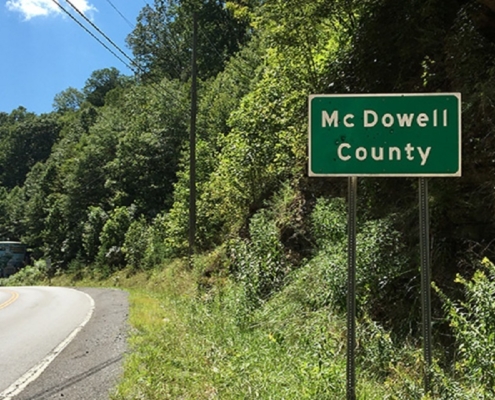
Introduction
For years, I’ve wanted to go to southern West Virginia and do original reporting on what’s alternatively called “the white death” and “the opioid crisis.” It is the greatest social malady of our time, and people who read this publication should care about its resolution more than anyone else. After more than a year of false starts, I secured private funding to go there, specifically, to McDowell County, the nation’s poorest and least healthy county, just east of Kentucky and abutting Virginia to the south in what used to be “coal country.” By way of disclaimer, I told everyone the truth: That this project was taken on as a freelance project and I wasn’t sure where it would be published. I did not advertise my more controversial views. For the sake of everyone’s privacy, each person I spoke to is described and quoted anonymously.
Finally, this essay is not the end result of a research project. I leave the task of documenting the sociological and economic origins of this crisis to historians and authors capable of obtaining grants and book deals. What I set out to do here was speak to actual residents of the area. I wanted to know what they had to say about it all and what they had seen over the course of their lives.
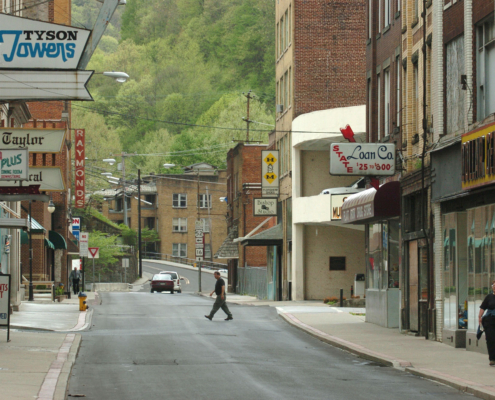
Photo of downtown Welch in 2004 when its population was around 2500
My drive into Welch (pop. 2406 in the 2010 census, estimated to be 1904 in 2019), McDowell County’s seat, is a long one, and what’s most striking is that the last two hours of it are nothing but turns on windy country roads surrounded by mountains covered in the lushest forests I’ve ever seen. I’d read a lot about this place, but nobody ever mentioned its natural beauty— or what a hassle it is to get to.
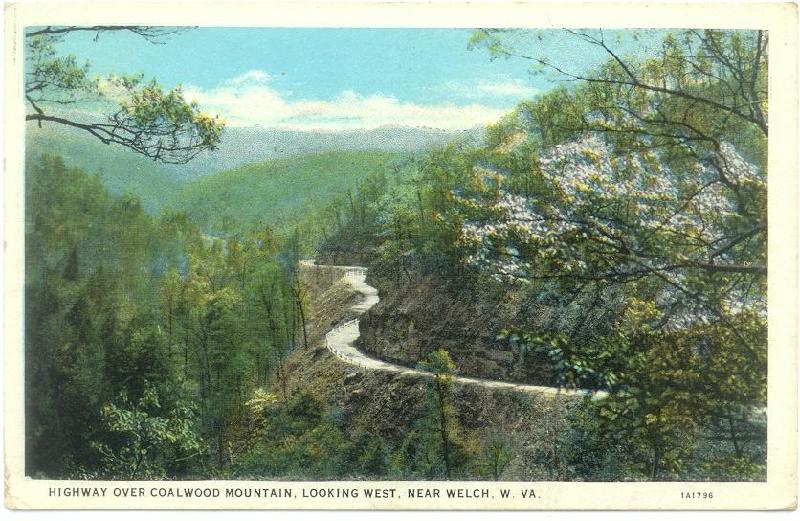
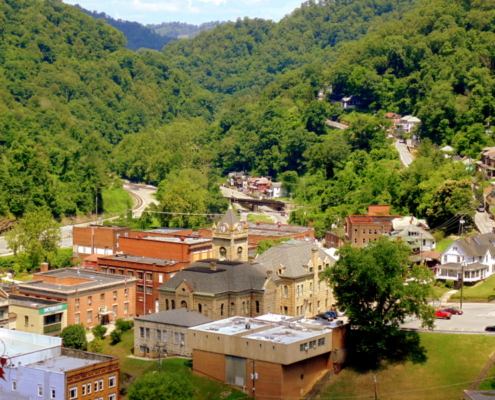
I arrive late on a Saturday and figure my best starting point is the bar I can walk to from where I’m staying. It’s small and largely unadorned. There’s a separate room full of slot machines, and everyone’s in there except me and the bartender.
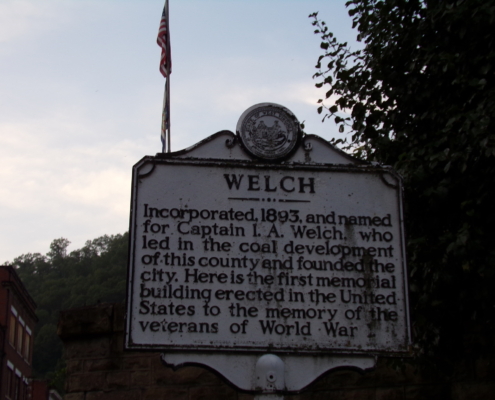
I do my best to chat her up, but she isn’t much of a talker. It’s clear that she isn’t suspicious of me or anything, she’s just shy. After disappointing me for the sixth time with a one-word answer, her face brightens and she says, “I know someone you can talk to!” She walks into the gambling room and comes back with another woman.
She’s a school teacher, and has been her whole adult life. She’s happy to speak with me and says she’s used to it: journalists always seem to be streaming in and out of McDowell County. What really strikes me about her is something I’d get used to over the next few days: She’s perfectly open about the area’s decline and its many problems, but takes it all in stride, and is genuinely proud to be from here. Most of all, she’s authentically optimistic.
“It pays to be poor,” she jokes about the money McDowell has started getting from government and charity alike. That line, more than anything else she said, captures the duality of frankness and hope that I’d soon find in nearly everyone in southern West Virginia. She grew up in Welch and says that when she was a kid, nobody ever had to leave the city— it had everything: supermarkets, department stores, car dealerships, etc. You don’t have to spend more than five minutes downtown to know that hasn’t been the case in a long time. There’s plenty of bad, and that is what outside journalists love to focus on, but there’s plenty of good, too. This teacher tells me all about both in one big cascade of information: More than the drugs and coal mine closures, what really sent Welch spiraling were the two devastating floods in the early 2000s. But now, there’s a growing tourism industry, especially ATVers making the most out of the rough terrain. There will be more and more of that in the coming years, and that means jobs and money. The Walmart in McDowell County closed five years ago and it was devastating. Now the nearest one is at least an hour away. But now retirees are moving to the area for the low cost of living, which is more good than bad.
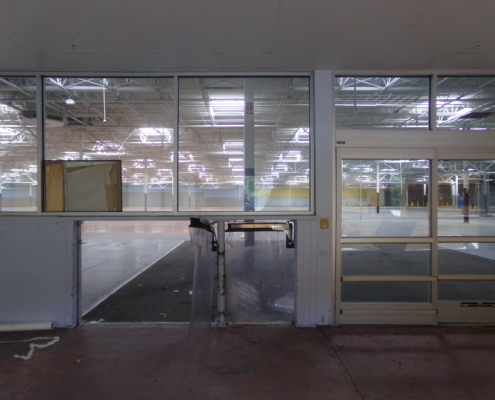
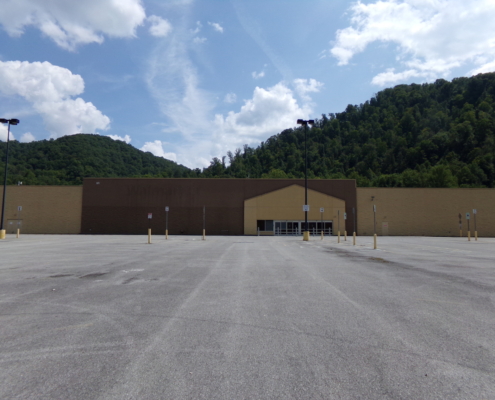
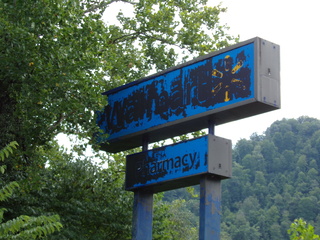
The small-town vibes are strong. She tells me people were really excited when a McDonald’s opened up in the area, and they feel the same about a Taco Bell expected to arrive soon. School activities here are a big deal both because there isn’t much else and because everyone wants to make sure the kids are alright, that their future won’t be defined by the area’s current problems. There’s nostalgia mixed with bitterness, too. Generations ago, this county was an industrial hub with ~100,000 residents. (Welch even used to be nicknamed “Little New York” and had a population of around 6000 in the 1940s.) Today the county has around 20,000 residents and is best known as the epicenter of the opioid crisis. “We built West Virginia. Now the state ends at Beckley (over an hour northeast of Welch),” she laments. “I miss seeing people I know,” she concedes. Later on, she says that people (like her sister) who left the area and came back don’t recognize it, and joke that those who never left “stayed too long.” But at the same time, she never insults this place or its people. She gives me a long list of people to speak to and sings the praises of each of them. It’s clear she doesn’t think the decline will last forever. She brings up that there’s a plan to connect a four-lane highway to Welch, and that this could bring all the uplift they need.
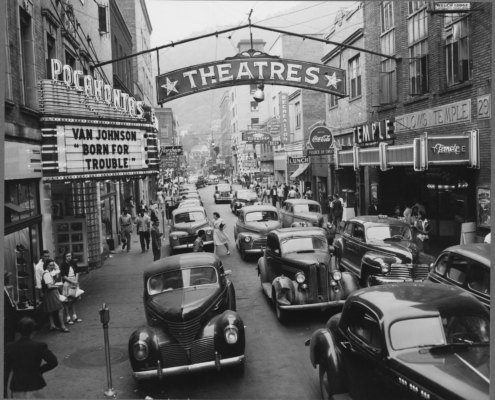
Downtown Welch in 1946, population ~6000
As a city-slicker, I find her optimism really striking. It isn’t forced and she’s got a list of reasons to back it up. I’m used to urban ghettoes where nobody thinks anything will get better and where apathy is so pronounced the question of whether the area will improve doesn’t even really make sense to ask, much less answer. All my life, liberals have told me that poor Whites are just as pathological as poor blacks, and that the dispossessed residents of Appalachia are just as violent and dysfunctional as the citizens of Chicago’s Southside. Walking back from the bar, I chuckle thinking about how I could go into 100 bars in Black ghettoes and never have one conversation with a local about the area as pleasant as the one I just had.
On Sunday morning I walk to a Catholic church. The service isn’t very noteworthy. Like just about anywhere else, it’s sparsely attended and the folks in the pews are almost all senior citizens. What did surprise me was the priest: A man from India with an accent. I wonder how he ended up all the way out here. After the service, one of the parishioners comes up to me with a big smile and asks where I’m from. “It’s that obvious?” I joke, because it is, of course, very much that obvious. We both laugh and I explain that I’m a journalist interested in southern West Virginia. We exchange phone numbers and agree to meet and talk later in the week.
I’m a sucker for diners, so after church I open up Google Maps to find the nearest one. In what I became resentfully accustomed to over the course of the week, I discovered that the nearest place was about an hour away. I drive to Dolly’s Diner in the city of Princeton, which is in neighboring Mercer County. Again, the drive feels like a series of switchbacks and blind curves surrounded by tree-covered mountains. When I get there, the restaurant is in the midst of its “post-Church rush” and I’m seated immediately only because there’s a lone stool left at the very end of the bar. Everyone (staff and clients) is White and about half the men are wearing baseball caps. There’s a real “grandparents and grandkids” energy to the place. Though there are certainly exceptions, you can immediately tell that there are plenty of absent parents in these families. Last night, the school teacher had told me that not only are there lots of people raising their grandchildren around here, there are even some people raising their great-grandchildren. The décor is what you’d imagine: Americana, cars, “In God We Trust,” etc. They sell Christian keychains from the Child Evangelism Fellowship. At the cash register there’s a notice for the “20th Anniversary 9/11 Stair Climb.”
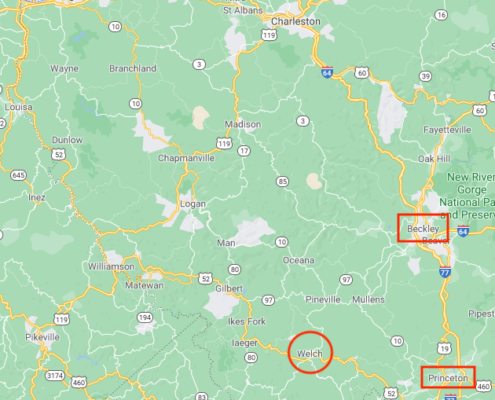
As I write all of this in my notepad two waitresses take notice and ask me (without a hint of suspicion) what I’m doing. I tell them I’m visiting the area from a long way away and taking notes. They like that answer and I take the opportunity to ask them what they like best about the place. They both say the natural beauty and the kindness of the people here. They say that people everywhere else are mean, even hateful. One mentions having gone to South Carolina only to discover that everybody there was rude. On cue, a man paying out at the register near my seat welcomes me to the area and wishes me the best with a big smile before he leaves.
When I get going, I think about the prospect of a major highway making its way to McDowell County. I’m near Highway 77, and it seems to have done well by the area: There’s Starbucks, Lowe’s, Outback Steakhouse, Radisson, Applebee’s, etc. It’s easy to shrug off those chains as shallow or uncultured, but they’re sure better than boarded-up storefronts—and they’re probably the same chains you find where you live. The American monoculture.
Back in Welch, I wander around town for a bit. I’ve lived all over the United States, but always in cities. The texture of life here is different. The internet is bad and cellphone reception is weak. There are plenty of pharmacies and churches, but not much else— though importantly, there’s not nothing else. What I notice most is that unlike in ghettoes, here, nobody is milling about looking for trouble. There aren’t layabouts loitering in front of any place that sells liquor. The parks aren’t filled with rowdy teens hoping to find a fight. And despite the area’s notorious drug problem, I don’t run into any toughs sitting on a bench or pacing around an intersection waiting for their customers. In every ghetto I’ve ever been to, it’s been easy to spot who’s hustling. Here, most everybody seems to be inside. I wonder if it’s all done behind closed doors.
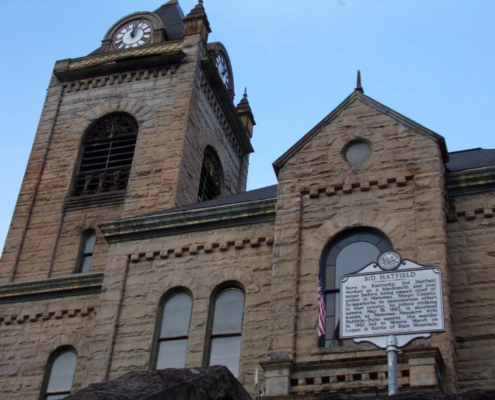
Welch government building
Later I get a bite to eat at a KFC. There’s a couple in their sixties having dinner and I ask if they might give me an interview. They agree, completely nonplussed. Their answers are almost exactly what any liberal journalist might have made up. Both love Donald Trump, but have never voted. Both thought about registering to vote just because they thought Mr. Trump was so great, but failed to do so in both 2016 and 2020. They think they will when he runs again in 2024. Both say the drug problem in the area got bad about twenty years ago and that they know many people who have overdosed. It’s clear they don’t want to go into details about that last part, and I don’t push it. He’s a retired coal miner, and not only were both his father and his grandfather coal miners, but two of his sons are as well. I tell them that, as I drove around today, it seemed like every two miles I saw a sign that said “ATVs Welcome” or some kind of ATV-related business. He told me that it’s all the rage now because that’s where the money is, but that it’s a relatively recent development. The three of us chat politely for a while. Before they leave, he gives me directions to their home and tells me that this way, if I have any car trouble near him, I’ll know how to walk to his place so he can help me. His generosity and trust really floor me. I immediately think two thoughts at once: What those waitresses said about the people around here, and that in any ghetto, a car breakdown can cost you your life.
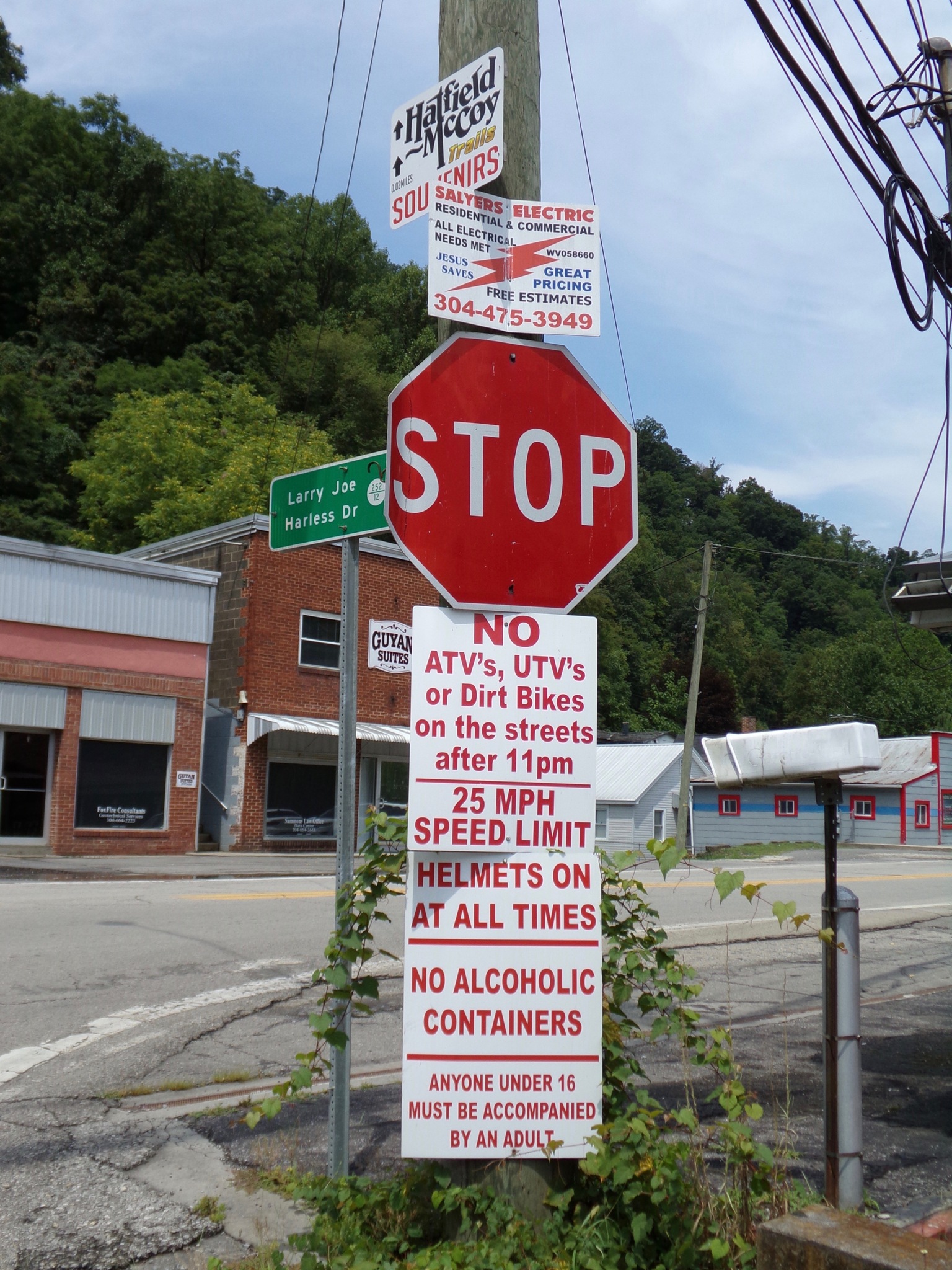
ATV Stop Sign
That night, I decide to go to another bar and see what more locals will tell me about the area. Once again, I find that there are slim pickings out here, and I end up driving the hour back to Princeton. Just like in McDowell, you can still smoke cigarettes inside bars in Mercer County. While I certainly enjoy it, it’s yet another thing that can give this part of the country a “land that time forgot” feel. In Minnesota, where I grew up, smoking in bars was banned some 15 years ago.
I meet a nice young couple who are clearly bright, progressive, and rather hip. He studied political science at the University of West Virginia in Morgantown, several hours north, and he’s very happy to talk policy with an outsider. My notebook gets filled in no time at all as I chain-smoke and he gives me his opinion on absolutely everything pertaining to West Virginia.
Perhaps I’m a jaded right-winger, but despite his obvious intelligence, some of what he says strikes me as naïve. He thinks all drugs should be legalized, and that removing the “stigma” of drug addiction would go a long way in solving the opioid crisis. I have a great deal of empathy for addicts, but there’s never going to be any way of removing the “stigma” around a class of people who will lie, steal, and take advantage of those closest to them in order to get a fix.
The point he hammers home most, however, is infrastructure. He brings up that in southern West Virginia, there are a lot of jobs in prisons (and the teacher I met on my first night said that education and healthcare provide the most employment for the area), and while those jobs aren’t great, they aren’t terrible, either. Perhaps best of all, they don’t despoil the environment the way the extraction industries do. He brings up how building a highway into McDowell would be a tide that lifted all boats. First there would be a wave of construction jobs, those men would then spend more money locally, and then the highway would make accessing the area easier, so more businesses would inevitably arrive. It’s not just big projects that are necessary, though. He tells me that plumbing is so bad in some of the more rural areas that people catch water runoff from mountain streams. He also brings up what many people are talking about now—that COVID changed everything: Since working from home is becoming the norm, people are going to move to cheap areas. West Virginia can reap the benefits of that enormously—but only if highspeed internet becomes more widely available.
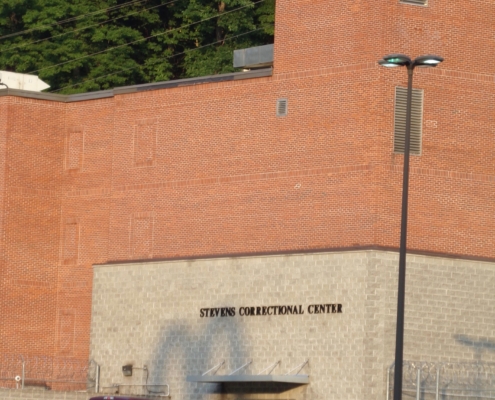 Stevens Correctional Center
Stevens Correctional Center
I tell him that I’ve been surprised at how everybody I’ve met around here seems proud of their state and their region, and that I haven’t found that to be the case in other poor areas. He and his girlfriend are especially interesting examples of this. It seems like almost every young progressive I’ve ever known hates where they’re from, can’t wait to leave, and loves to talk trash about wherever it is that they grew up. He laughs a little and says that since everyone else insults West Virginia, West Virginians refuse to do so. His girlfriend agrees, and he talks about how in the southern part of the state there’s a real sense of community and solidarity. In the public schools I attended in St. Paul, students were lectured constantly about “community.” The school was a community, gays were a community, the disabled were a community, the planet was a community of nations, we should all go to college and get jobs helping our “communities,” etc. It always felt so forced, so manufactured, that by the end of high school I thought I’d developed an allergy to the word. In college I knew a liberal who once told me he had an ex-girlfriend who was “active in the rave community.” But here, in West Virginia, the word actually seems to carry some freight, have some tangible implications.
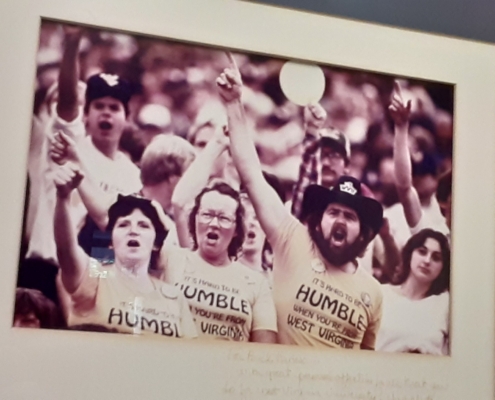
It’s Hard to Be Humble
Like everyone else I’d met, he wasn’t shy about the area’s problems. He has known people who died from overdoses, and said I wouldn’t find anyone who could say otherwise. But he was confident that the worst was behind the state, putting the grimmest year at 2017 or 2018. In my notes, I wrote, “Hope and Empathy in Southern WV” (vis-à-vis) “Fear and Loathing in Las Vegas.”
On Monday morning I went to an ATV shop in Welch and spoke with one of its owners. Incredibly, in the middle of the day he spoke with me for over an hour, pausing only a handful of times to attend to customers. He grew up in the area, and like everyone else who did, remembers its former glory, saying that when he was a kid, going to Welch on a Friday evening beat going to the beach on Saturday. He left the state in 1994 and says that at that point, the decline was apparent but still not bleak. He came back in 2013 and things had gotten much worse. His comments mostly fit the pattern I started noticing early on: Things are bad, but things are getting better— especially since the people who live in the area are the best folks you’ll find anywhere. “I know what was once here and I know it can come back,” he says. He’s a bit biased on the subject, but like everyone else, the growing ATV/tourism industry gives him a lot of hope.
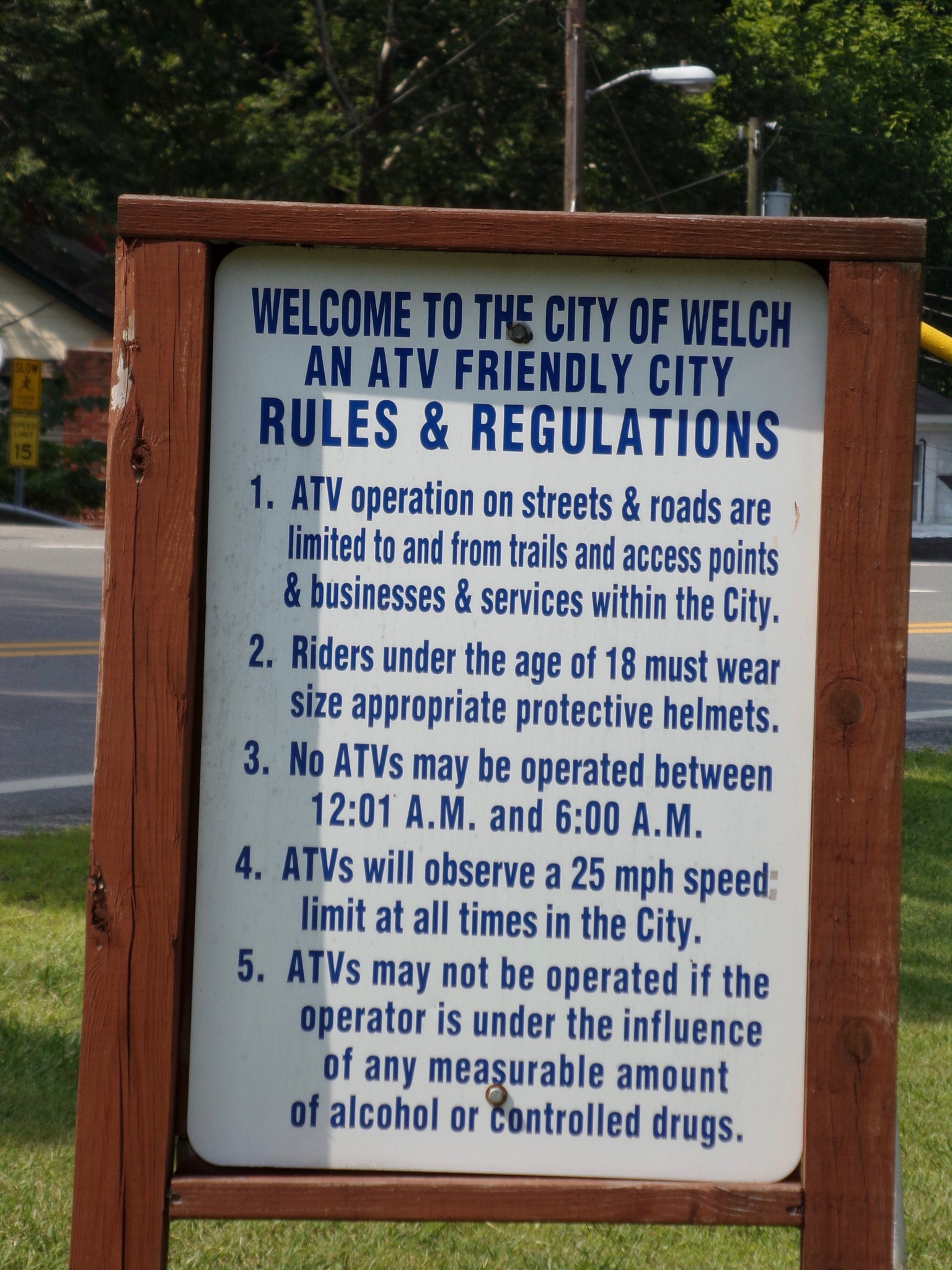 ATV Rules
ATV Rules
Like the young man from the bar the night before, this guy explains how in southern West Virginia, the tourism industry and the extraction industries are locked in combat. Nature preserves and hiking trails create “no-go” zones for mining and lumber companies, so the latter fight hard against the creation of the former. Extraction brings in more money than tourism, but the resources they’re pulling out of the ground can’t last forever— tourism can last forever . . . so long as nobody destroys the area’s natural beauty. With no disrespect intended to the area, I can’t help but note that this same economic tension can be found throughout Latin America.
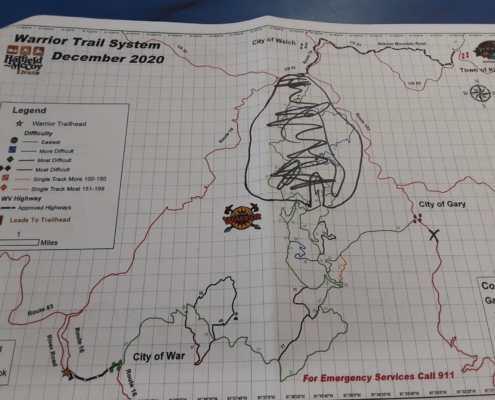
Warrior Trail System. On this trail map, my informant used a black sharpie to show me how much had recently been closed at the behest of one extraction industry or another.
At one point his wife comes in and asks me pointblank if I’m an honest journalist. I say that I am, but admit that if I wasn’t, I wouldn’t say as much. She gives me a look and I assure her that I intend to quote everyone anonymously, which seems to mollify her. He then shares some horror stories with me about liberal journalists coming into town and making the area sound like a hellhole of poverty and stupid rednecks. I tell him the truth: That to my surprise, everybody here has a real dignity to them, and that their optimism seems based in reality.
Later on, a customer comes in without a shirt on and his chest sports a tattoo of Psalm 23— the one most famous for its line about the “valley of the shadow of death.” In the next few days, I bump into Psalm 23 again as a poster in a government office and another in a private dwelling.
I ask him about the drug crisis and he says, “We have a long way to go.” He shares a heartbreaking story about a woman in her late twenties who’d been clean for years until relapsing eight days ago. She died. “You just wait on that phone call,” he states flatly.
There’s a food bank across the street and I pop in to see if I can speak to one of the volunteers. Again, despite it being in the middle of a work day, I find someone who’s happy to set aside some time to talk to me. She’s a woman in her thirties from neighboring Wyoming County. She tells me upfront that she wants to talk only about the positive. We talk for a while about the logistics of her food bank and her high opinion of the mayor (the man at the ATV store said the same thing). Her recommendations for improving the area are fairly standard: better public transportation, a rehab center in Welch itself (not just relatively nearby), bringing down the high-level drug dealers, etc. By now I already feel like I’ve heard this a million times, but she tells me that it was the devastating floods of the early 2000s that really brought down Welch, much more so than the drugs the national media prefer to talk about.
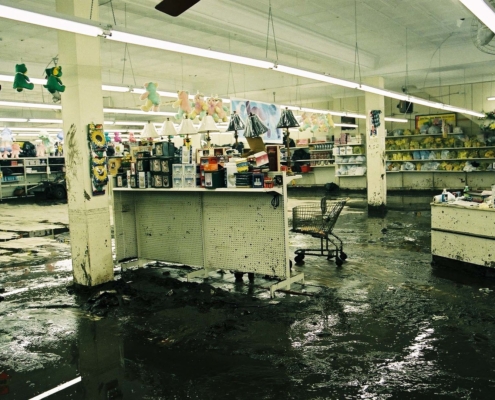
Welch, WV, May 9, 2002 — The Dollar General in Welch, West Virginia lost its complete inventory the second time in two years due to the May 2, 2002 flash.
Bob McMillan/ FEMA Photo
She tells me that, “I wanna see us be something,” and believes the drug problem is getting better, placing the worst of it at around 2018 or 2019. By now I had already heard several tragic stories about fatal overdoses, but when she tells me her husband died in March (without specifying the cause), it hits me harder than any other death I’ve heard about. She’s now a single mother of three, and still volunteers at a food bank. She admits to having thought about suicide, but that “God keeps me going.” She says she cries at night, not during the day. The last thing she tells me is that “McDowell County is a good place; it’s a whole lot more than we get credit for. We’re trying to get somewheres.”
I doubt if I’ll ever be able to convey this without sounding condescending, but there’s a noble durability to the people here that I’ve never encountered before. We’ve all faced hardship. I’ve known people who committed suicide and people who died from overdoses. The 2008 economic crash hit my family hard, too. But like with most things, hardship is a question of scale. The scale of grief so many of these people have endured is like nothing I’m familiar with. And yet they all seem happier, friendlier, and more optimistic than I am. Some might say I’m making “noble savages” out of the residents of southern West Virginia, but that’s not it. There’s nothing savage about them. Savages shoot at helicopters trying to evacuate hospitals because of a natural disaster. There’s nothing savage about volunteering at a food bank or running an ATV shop. I’ve lived in ghettoes before and seen plenty of savagery. Savagery is a gang of teenagers beating a pregnant woman to the ground. I’m still new in town, but it’s hard to imagine that happening in McDowell County.
I have a late lunch at a restaurant in Kimball, just a few miles from Welch. More than one person recommended that I speak to the woman who runs the place, another lifelong resident. She’s as friendly as everyone else and confirms a lot of what I’ve been hearing: It was the floods that really marked the beginning of the decline, there’s hope in the tourism and the incoming retirees, she remembers the good old days, etc. The mix of hope and frankness is as present in her as in anyone I’ve spoken to: “If ATVs are our lemons, let’s make lemonade. Will it be our salvation? Probably not.” If anything, she’s somewhat more frank than hopeful. I tell her I really appreciate her honesty when she concedes that bringing backs jobs isn’t as simple as building new businesses, because plenty of people in the area no longer want to work. She has more insight about the economics of the area than anyone else I’ve met, noting that Walmart came to town, ran everyone out of business, and then closed down. These are the kinds of stories that one day might just make a liberal out of me. She also tells me that a joke I’d heard earlier is actually a known saying: Out here, after high school, you’ve got four options: college, military, mines, or fast food.

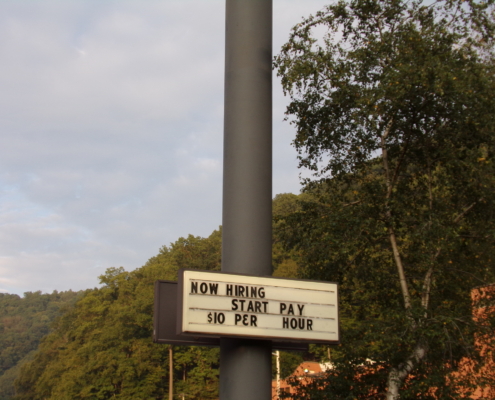 McDonalds hiring: $10 Per Hour
McDonalds hiring: $10 Per Hour
She’s a first responder as well as a restauranteur, and it’s clear she’s seen a lot— and she wishes young people could see her dealing with the overdoses, the car wrecks, and the misery of it all. Her first year in the field was 1985, and she says this past year was the worst one she’s seen, likely because the COVID-related increase in welfare handouts gave a lot of unhealthy and unhappy people more money to spend (a few days later, a local journalist confirms this). As I write that, I realize that everyone I’ve spoken to has put the worst year at one or two years more recently than the person before. The millennial at the bar said 2017 or 2018, the woman at the food bank said 2018 or 2019, and this woman is saying 2020.
“Our people have some of the biggest hearts. If you have a problem, it’ll be a problem for everyone,” she tells me. She follows that up with a story from her time as a college student in New York City. Once, she was on the subway with some peers and saw a man have a seizure. She was the only person who ran over to try to help him. Not only did her fellow students do nothing, they told her she should stop trying to help because it could be some type of scam or setup. Perhaps the man was faking it so that he could pickpocket whoever came to his aid, or something like that. She told me that she still wonders about that day, if she should have done more because it was a real medical emergency, or if she should have done nothing at all. Apparently, people have told this woman to her face that she likes McDowell County only because she has no point of comparison. This is the story she always shares by way of reply. That kind of conundrum is unimaginable here.
At the risk of belaboring a point, this woman has seen more devastation and heartache than I probably ever will. But her story about New York City is very meaningful. The Big Apple has plenty of drugs and suicide, too. But the coldness of its people (which I’ve encountered firsthand) is a type of alien cruelty that’s inconceivable here. This wasn’t something I’d thought about at all when I made plans to come here.
The next person I speak to is an elected law enforcement official gracious enough to give me an interview. Police are normally leery of journalists, but this guy makes it clear he has nothing to hide. We talk about crime, of course, but more specifically, why it is that McDowell County has relatively little crime. “Experts” love to explain how poverty causes crime, but if that’s true, southern West Virginia is quite an outlier. He tells me that McDowell County averages one murder a year, although there were three in 2020, and that basically all crime is drug-related: possession of drugs, distribution of drugs, and theft/burglary to buy drugs. Despite that, people here don’t feel the need to always lock up their homes and their cars, and he notes that there’s nowhere in the whole county where someone would fear for their safety if their car broke down.
I ask him what he thinks could be done to fight the drug crisis and he doesn’t hesitate to tell me that tougher sentencing is need, “Holding jail terms over people’s heads is good,” he says. He talks a bit about how demoralizing it is to bust dealers and see them back in the streets only a few years later. Moreover, lighter sentencing has made it harder to get low-level arrestees to become informants or just squeal on the people above them in the food chain.
When I bring up tougher border security as a way to cut back on the flow of drugs, he agrees that it would help, but stresses that focusing on the southern border would not be enough. He wants to see better screening in the ports on the East Coast. Some have suggested that federal agencies, like the DEA or ATF, should come into the area to help stamp out the opioid scourge and I ask him if he thinks that would help. He says it could, but circles back to the issue of light sentencing. He points out that even if the FBI came in, all their expertise and resources wouldn’t make a difference if the people they bust still had to serve only a year or two in prison.
He’s the first person I speak to who is unwilling to say that things are definitely looking up: “I would never say the worst of the worst is behind us.” But like everyone else, he says the region’s citizens give him hope: “They’re not gonna give up.”
That night I get dinner at local restaurant in Roderfield, about ten minutes from Welch. Like the diner in Mercer County, its decor is solidly Christian Americana. The waitress is nice and clearly surprised that I want to speak to her about her own life, and life in general in this part of the country. She’s the first person I meet who isn’t from here. She grew up in a Buchanan County, one of the poorest parts of Virginia. With the help of the Department of Housing and Urban Development, she got an apartment nearby, believing there were more jobs in this area than in her home town. She concedes that she didn’t know how bad things were in McDowell when she came here. All the same, she’s done well for herself. She has a serious boyfriend and they want to move to Tennessee. She tells me she’s never been tempted to use drugs and doesn’t have anyone in her social circle who uses. She is very surprised when I tell her I think I would be tempted if I lived here. (To be perfectly honest, throughout my teens and early twenties, I partied a lot— with all the drug use that that implies. It’s grim to admit, but I’m not sure I would have made it past 25 if I’d grown up here.) She has more than a few horror stories of the kind you can easily find from other reporters who focus on the area’s dispossession, but she doesn’t want me sharing them. However, she is the first person to tell me that the drug crisis is getting worse, not better. When I ask her what she wishes outsiders knew about McDowell County she says, “I don’t know, I honestly don’t.”
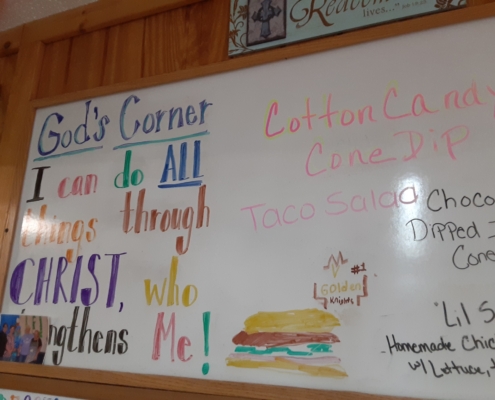
God’s Corner
The next morning, I interview the mayor of a town in McDowell County. Both he and the employee who makes our conversation happen are very clear that they don’t want to talk to me if I’m just going to write yet another sob story about how awful the area is. They’ve had plenty of journalists come through and pen bleak writeups about how miserable everyone in McDowell County is, and they hate being portrayed that way. I tell them that so far, just about everyone I’ve interviewed has been optimistic, and the area isn’t nearly as rough as I’d imagined. With that, the government employee gives me a useful list of people to speak with, and even makes an introduction or two.
The mayor is by far the most optimistic citizen I’ve spoken to. He says he has “no clue” why the area has a bad reputation and that “crisis” is too strong a word for the drug problem, the worst of which has long gone by. “Every place in the whole world has that issue,” he insists. While that’s true, it’s also not that simple. He talks a very big game about tourism, saying that the area can become another Dollywood, but he’s not building castles in the sky. He’s smart enough to note that although visiting dads will be happy to ride ATVs all week, the area needs to build things for mom and the kids to do: fishing ponds, ziplines, amusement parks, etc. Over and over as we talk, he says his boundless optimism is rooted in the goodness of the citizenry: “People are our greatest advantage,” “We’re a frontier that can make anything happen,” “We’re on the move and we’re gonna keep moving,” “We have the mentality there’s nothing we can’t do,” etc.
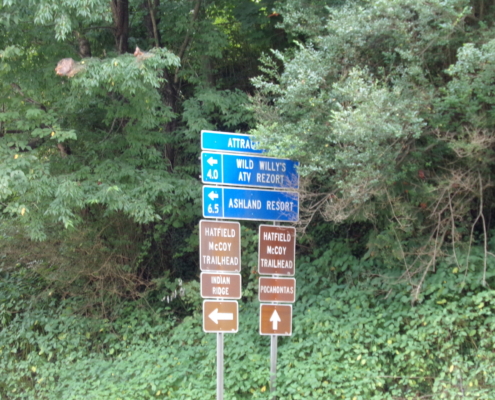
ATV Resort
If I had met him on my first day, I’d have taken him for a total Pollyanna. But after speaking with so many locals, I can’t see why anyone shouldn’t have faith in this place and its people. His optimism is maybe a bit much, but he is, after all, a politician talking to an outsider (though, for the record, he did tell me unequivocally, “I don’t consider myself a politician”)— and he’s not wrong when he says a positive attitude at the top is necessary because it will filter down to everyone. When I push him on how strange it’s going to be for a region to transition from an industrial juggernaut to a tourist hamlet over the course of living memory, he admits that I’m right. But he won’t let that weirdness get to him. If that’s the change that needs to happen to keep the place afloat economically, then that’s what needs to be done. Like the restauranteur, he says something about making lemonade out of lemons.
On my way out, a government employee, presumably familiar with the mayor’s can-do attitude, reaffirms that this place really isn’t so bad, it’s not all drug addicts and desolation the way the mainstream portrays it. I tell him he’s right (because he is) and note that I have yet to hear gunfire— and I’ve lived in places where you hear it pretty often. “Oh, you will in hunting season,” he replies, grinning from ear to ear.
My next stop is another food bank. The woman who runs it was hesitant to speak with me, but by this point had already heard from other locals that I seemed alright. When we meet, she is absolutely insistent that I better not spin a tale of doom and gloom. She says that if I’m going to do that, I should leave, and that she has kicked journalists out of her food bank once it became clear they were just looking for sob stories. I swear up and down that I’m going to write honestly about what I find, and that so far, I’ve found more hope than anything else.
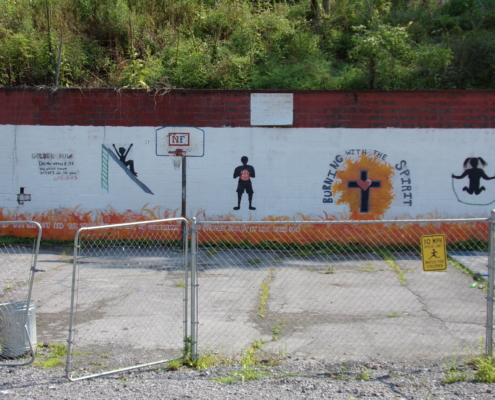
Playground mural
Perhaps I’m repeating myself to the point of tedium, but this woman, like so many other people out here, is a fascinating mix of brutal honestly about the area and indefatigable pride in its people and hope for its future. My notes from our conversation are a Jackson Pollack painting of this dialectic. She tells me that, “People let their hurts take them to the grave,” but, “I want to speak life into people.” She gives me a stern look and says, “Don’t think I don’t cry,” but that “every day is a new day.” More than anything else, she talks about choice. Eve had a choice in the Garden of Eden, and people here have a choice, too. She can’t stress the matter of choice enough, and it’s clear that for her, that’s the big source of hope. Addiction and despair are choices, not destinies. With choice, the future remains unwritten. I’m not convinced it’s as simple as that. But this woman is a force of nature. Her food bank is massive and it’s entirely privately funded. She shows me around and it’s well-stocked, to put it mildly, not only is there food but there’s school supplies, toiletries, just about everything, really. I’ve lived a life of privilege compared to this woman, but she’s the one doing God’s work. It doesn’t really feel like she’s given me any choice about feeling impressed and humbled.
I spend the afternoon driving around, trying to get a better feel for the area and hoping to find more people to interview. McDowell County isn’t especially populous, but it’s still huge: 535 square miles. Atlanta, one of the most spread-out cities in the country is just 134 square miles. Every store here (restaurants, gas stations, pharmacies, etc.) has a sign advertising that they sell passes for the Hatfield-McCoy Trail, the main tourist attraction.
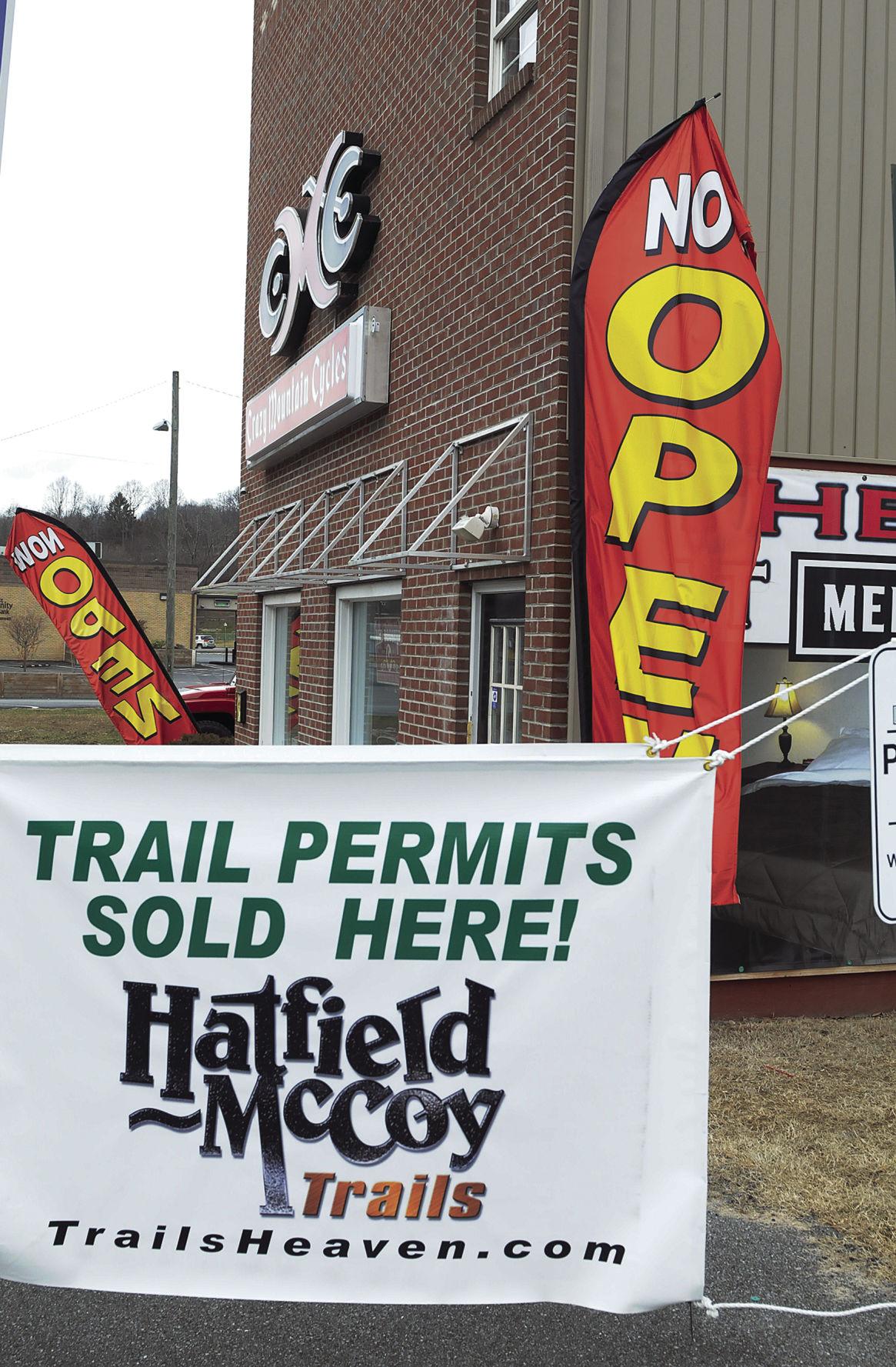 I make it to Bradshaw, which many people in Welch seem to consider the more rural, more redneck part of the county. I didn’t get that sense, but it’s certainly poorer than just about every other town I’ve visited. I try to go to a town called War next, but my phone loses all reception and internet connectivity. I get hopelessly lost, and honestly, War might be so small that I drove through it and didn’t notice. When I finally figure out how to get back to Welch it starts pouring rain, and with the roads being as curvy and narrow as they are, with no shoulder to pull off onto, for a few minutes I wonder if I’m going to make it back in one piece.
I make it to Bradshaw, which many people in Welch seem to consider the more rural, more redneck part of the county. I didn’t get that sense, but it’s certainly poorer than just about every other town I’ve visited. I try to go to a town called War next, but my phone loses all reception and internet connectivity. I get hopelessly lost, and honestly, War might be so small that I drove through it and didn’t notice. When I finally figure out how to get back to Welch it starts pouring rain, and with the roads being as curvy and narrow as they are, with no shoulder to pull off onto, for a few minutes I wonder if I’m going to make it back in one piece.
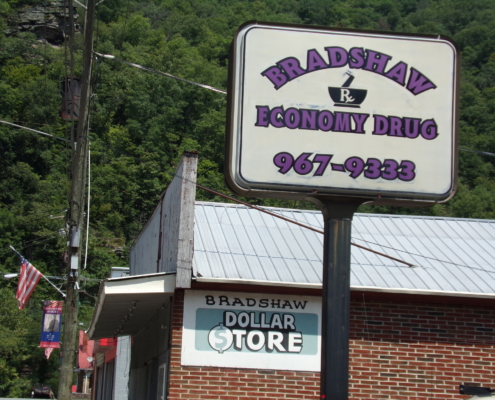
Bradshaw Economy Drug
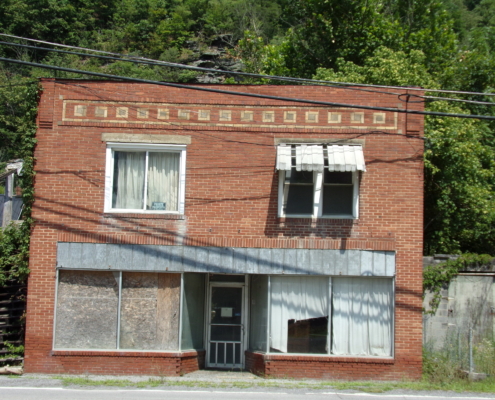 Empty Bradshaw Building
Empty Bradshaw Building
When I get back to where I’m staying, I’m so exhausted that I take a nap. I’m probably just an ugly outsider for saying this, but I really have no idea how people here deal with these roads, especially since you need to drive to get anything. A few hours later, I drive to Pineville in neighboring Wyoming County and step into the Ole’ Jose Grill and Cantina. It’s the first complete tourist trap I’ve been to out here. Everyone inside is an ATVer, and the restaurant has a generic, antiseptic atmosphere that I can’t stand.
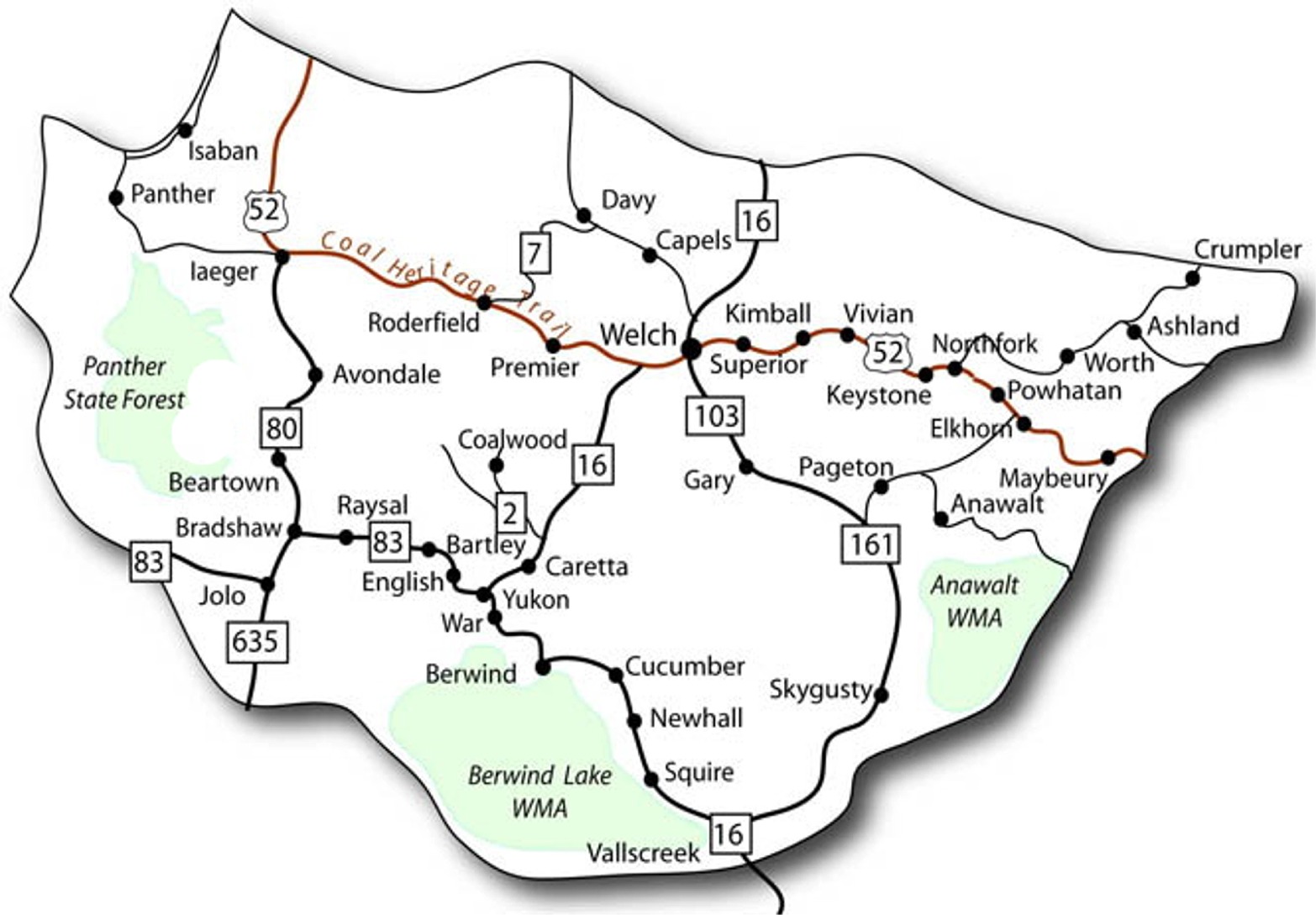
Map of McDowell County
Back in Welch, I walk down into a valley of sorts behind a row of apartment buildings. There’s a big park with a pool, basketball courts, etc. Southern West Virginia has a reputation for being solidly White, but McDowell County is actually almost 10 percent Black. At the pool, it suddenly feels like I’m in a big city again. Everyone there is Black except the White lifeguards. Unruly kids are running around everywhere, it’s loud, and not just because someone is blaring rap from a set of speakers. One guy is driving his ATV back and forth on a little pathway, making all kinds of racket. The smell of marijuana is unmistakable. I wasn’t born yesterday, so I leave. The Whites I’ve met here aren’t much like Whites I’ve met elsewhere, but the texture of Black behavior is always the same. See, for example, this music video made by some of the area’s aspiring rappers. I believe it was filmed in one of the apartment buildings near this pool.
That night I go to interesting local business in Welch. By day, it’s something of a family restaurant with pizza and burgers. But it’s also got a bar you can smoke at, and an adjacent enclosed room filled with slot machines. I get a sandwich and some coffee and start chatting with the White girl working the register who’s just a few years younger than me.
She’s impeccably sweet and all too happy to pass the time with someone new. She volunteers her life story with little coaxing. It’s intense, to be sure. There’s drug use, illegitimate children, legal trouble, etc. And yet, her positivity shines through it all. She plans on staying in the area because it’s where all her family is. Moreover, the people here are great. Earlier that day, she’d gotten a flat tire and found help in no more than 15 minutes. “It’s boring [here], but help is always just 15 minutes away,” she observes.
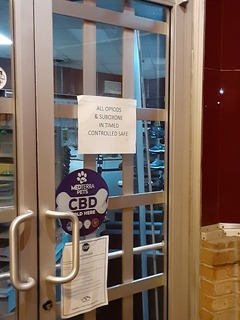 Doors of a Welch Pharmacy
Doors of a Welch Pharmacy
Much of what she says I’ve heard before at this point: The floods were the beginning of the end, the tourism industry is a sign of hope, that the loss of the local Walmart was devastating, that not only is there a need for more grocery stores but for social spaces as well (arcades, bowling alleys, etc.). I ask her if working where she does has made her think gambling should be banned. While she admits that she sees plenty of people spend way too much time and money at the slots, she notes that the thrill people get from gambling is still much better than the ever-present alternative for thrills: drugs. She follows that up by pointing out that if addicts lose all their money gambling, that’s just less money they can spend on poison. That perspective is cynical, but she might be on to something.
She can’t say for sure when the worst year of the drug crisis was, and isn’t willing to say that the worst of it is over. I wonder if that’s informed by her own past drug use. At the end of the night, her own version of the area’s signature blend of pride and pessimism gets especially intense. She says she wishes outsiders knew that people in McDowell County are normal, not shoeless hillbillies. When I ask her for her best prediction for what the area will be like in 40 years, her answer startles me: She says by then, there might not be anything left, that everyone will have died or left. Even still, she says, “if the apocalypse comes, I’d still rather be here than in a big city.”
I’ve never been religious, but that night I talk with some devout New Englanders who live near where I’m staying. They came to the area on an uplift mission and ended up staying and starting a family. The husband tells me with no hesitation that if he were an atheist, he’d be cynical about the area and have left long ago. But he isn’t. Moreover, he says it’s the people here who teach him about God, not vice versa. On top of that, he tells me that the misery these people have endured is spiritually redemptive, and that God will reward them for it in the next life. I can’t help but find a certain logic to this. These people have every reason to be angry, and could come up with a long list of excuses for self-destruction and nihilism, but none of that is in play here, at least not in an endemic way. It’s hard to know exactly what to make of it.
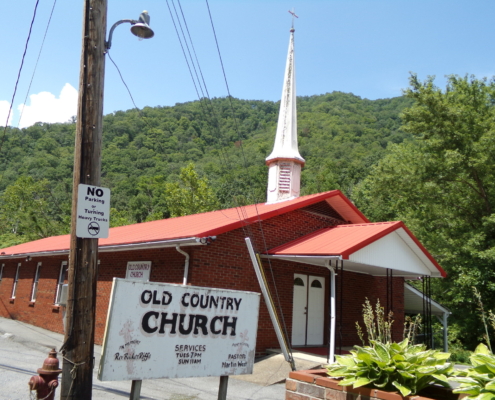 Old Country Church
Old Country Church
The next day I drive, sharp turns all the way, to a rehab center in neighboring Mingo County. It’s a live-in place for women only, and the staff is kind enough to let me anonymously interview any resident willing to talk to me. I speak to three women back-to-back over the course of about an hour and a half. It’s a gut-punch that leaves me reeling and desperately wondering if I just crashed up against a brutal reality-check. I’m not unfamiliar with people who have messed up families, broken marriages, and checkered pasts, but these three women’s stories are on another level. I don’t want to indulge in “pity porn” or make them feel like their privacy has been violated, so I’m going to skip the gory details.
But more than the hell they’ve all been through, what gets to me is how they answer my questions at the end of each interview. Not one of them said there was any reason to think things will get better. Not one was willing to say the worst of the drug crisis was in the rearview mirror. In short, they all said things will only disintegrate further, and that everyone who’d told me otherwise was out-and-out lying to me, lying to themselves, or both. Here are some quotes from the three of them:
“It’s more than a crisis.”
“It’s only gotten worse so far.”
“The [types of] drugs will change but I don’t think the scenario ever will.”
“These other people are feeding you some bullshit.”
“It’s only going to get worse.”
“I know if I were on drugs, I’d feed you a bunch of bullshit. Just being honest.”
I drive back to Welch wondering what on Earth to believe. I return to the bar I went to my first night in town and can’t help but tell the first person who will listen about what I just heard. She tells me the women at the rehab center may well be right. She grew up here, left, and came back. She’s struggled with addiction and still hates the doctors who got her started. “I’m not supposed to be here,” she says, and tells me she’ll be leaving again when she gets the chance.
Staying at this bar and knocking back more beer is not a good idea, so I leave to meet up with the religious New Englanders I’d met a few days ago. Almost as if the whole day has been scripted, the wife tells me she can’t imagine enduring all this chaos without trusting fully in God’s plan. That’s not just the opinion of an outsider, either. Most of the locals here seem to feel the same way. Not all of them, of course, but a lot of them. The Russian novelist Fyodor Dostoyevsky once said, “If someone succeeded in proving to me that Christ was outside the truth, and if, indeed, the truth was outside Christ, then I would sooner remain with Christ than with the truth.” Everyone in this part of the country is a thousand times more resilient than me. That sounds corny, but it’s true. And their faith is a cornerstone of that reality. It occurs to me that my atheism has nothing to offer people here, but that their God, with his courage, forgiveness, and long view, has a lot to offer me— regardless of whether he exists. What’s more is that my lack of faith isn’t slowing anybody down out here, but their spiritual confidence really does give me a sense of hope. It was just the other day that the male half of this couple told me the locals teach him about God, not the other way around. The faithful have crises of faith, but what’s discussed less often is that atheists have crises of disbelief. In that moment, I started to feel like a character in a Flannery O’Connor story who sees the grace of God just before some gothic horror strikes them.
Over the course of my last two days there I do a lot more driving. I visit all the cities closest to Welch that people have named as the best places nearby: Tazewell, Virginia; Bluefield, West Virginia; and Beckley, West Virginia. Tazewell is cute; an interesting mix of God’s country (unvandalized Confederate monuments, MAGA signs, and motorcycles) and the kind of bucolic small town our liberal elites love to vacation in (local brewery, pricey coffee shops, and a fancy brunch spot). Bluefield is a bigger, less poor Welch. There are boarded up shops right alongside nice office buildings. Beckley is like one of those mid-sized cities you stop to get gas in on a road trip. It’s perfectly pleasant and middle-class, but doesn’t have much character. I go to a few museums about mining and feel much more like a tourist than a journalist.
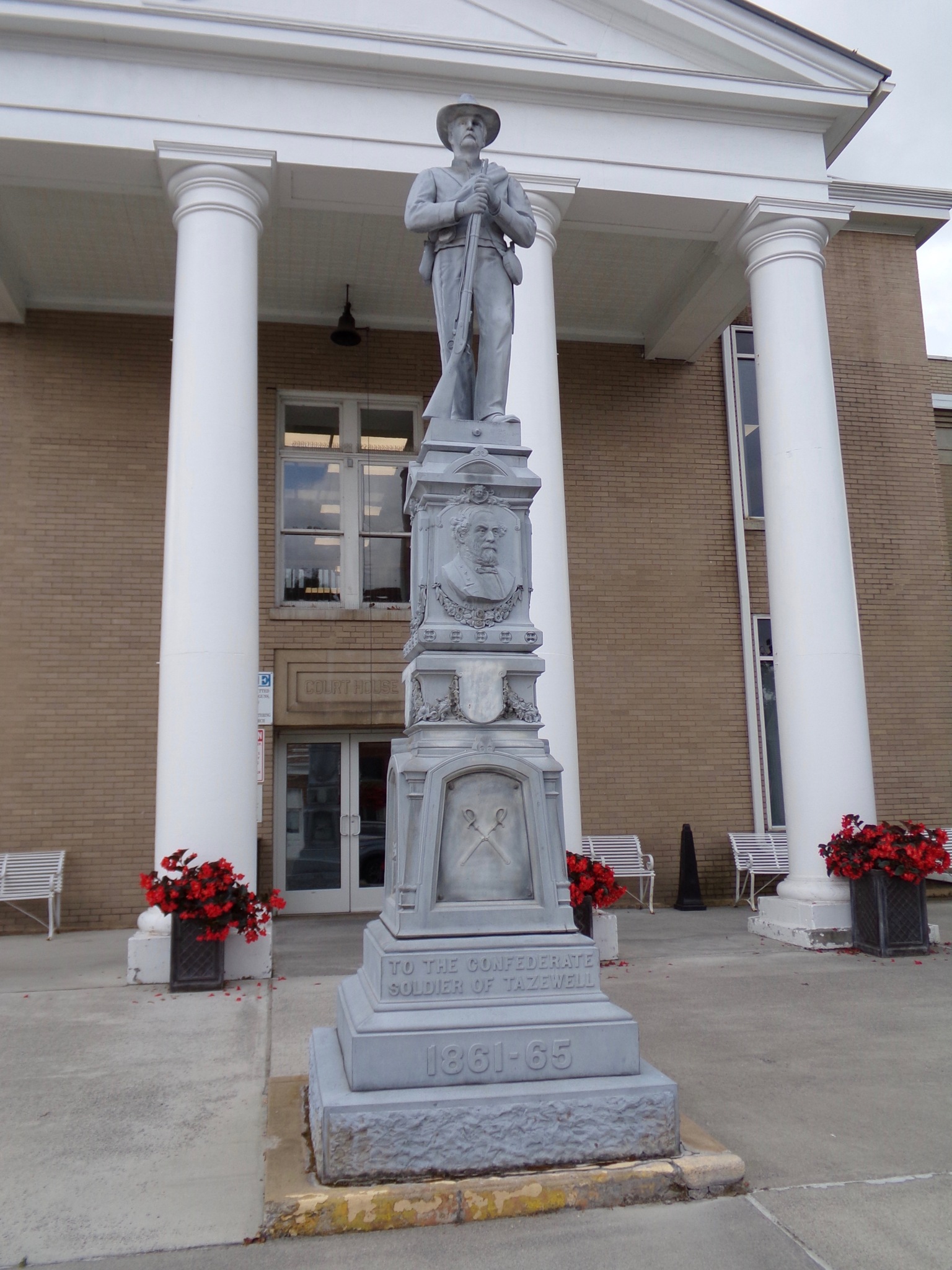 Tazewell Confederate Monument
Tazewell Confederate Monument
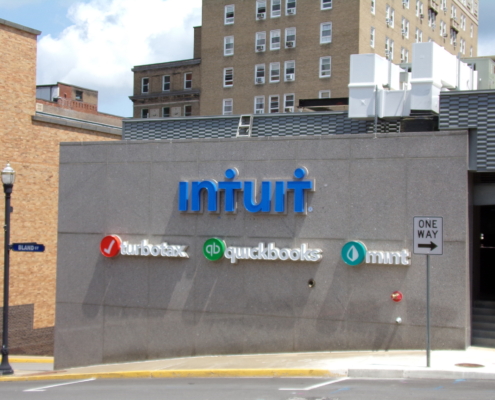 Bluefield Office
Bluefield Office
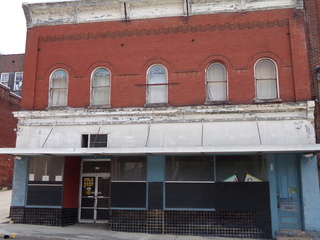 Empty Bluefield Building
Empty Bluefield Building
When not meandering, I spend much of my last 48 hours with two fascinating Welch locals, a woman in her fifties and a man a few years older than me. They’re the smartest people I’ve met out here, and over the course of hours of conversation with them, they humble me over and over again. At her age, and having lived almost her whole life in McDowell, there’s nothing she hasn’t seen, but she’s still here, still surviving, still hopeful, and still working for a better tomorrow. He’s basically my age, but his life has been tougher than anything I can comprehend. I don’t know how he manages to share so many stories about overdoses and suicides without crying, but he does.
At the end of the week, I drive home and there’s everything to think about alone in my car for hours and hours. It’s as if I can’t even remember what I was expecting to find now that I’ve seen so much. Southern West Virginia is poor, and the stories of its heartbreak could fill the Library of Congress a hundred times over. But I knew all that before I got there— you probably did, too. However, it’s not some kind of “big White ghetto” in the midst of a Hobbesian war of all against all. I’ve really never met kinder people. I’ve also never met a people more determined to withstand it all and persevere. The place enlightened me— but only after it humbled me. All of us really do have a lot to learn from these people. Marcus Aurelius wrote that, “Nothing can happen to any man that nature has not fitted him to endure. Your neighbor’s experiences are no different from your own; yet he, being either less aware of what has happened or more eager to show his mettle, stands steady and undaunted. For shame, that ignorance and vanity should prove stronger than wisdom!” My Christian friends assure me that Christ agrees. I couldn’t tell you if God is real, but after a week in Welch, I do know for certain that God smiles upon southern West Virginia— and on the rest of us as well.





What a wonderful article. I have found most places in the deep country are similar to this. I agree with the man who wanted to legalize drugs. The cost of the failure of the war on drugs are to high.
Looked quickly – I will read it all. Looks very interesting – I am thinking some of moving to W Virginia (or similar area) – looking for Covid freedom; less or little density 5G / wifi / cell radiation – and maybe even some good people. (Live now in big blue crazy coastal state – mandates and passports look to be just ahead.)
An excellent article. My Step-Father is born and raised in West-By-God-Virginia, and so an extended portion of what I consider my family is from there. I certainly do not know the people you interviewed, but feel like I have met people like each of them on many occasions.
One reason I won’t shop at Wal-Mart (even though I live in a place with a 40K+ population, and we have two of them here) is because of what they’ve done to small town USA; get everyone addicted to Chinese-made garbage (which in itself is abominable), undercut all of the existing Mom & Pops, who have to charge more, because they don’t have the bargaining power of a multi-billion dollar corporation backing them, and then bail. Large corporations which wish to invest in small communities should be forced to pay a large surety to the local Chamber of Commerce in case they abandon the project; that money could be used to rebuild the economic infrastructure of the place when they corporation moves overseas when the corporate tax rate increases, or when a new trade deal with Mexico is worked out, etc. Usually, it’s the opposite; they’re given waivers for property taxes for X# of years, because they’re going to bring jobs, or customers from outside of the community, etc. Mining and Timber companies are now required to do restoration work of the areas of extraction, as well as take many considerations as to how to prevent contaminating water supplies and the like, but that abandoned Wal-Mart will stand in that asphalt lot until 1) someone buys it and repurposes it (maybe as a giant indoor ATV store) or 2) it becomes dilapidated and collapses.
I, for one, having lived in small towns like the ones described in your fine article, feel that a 4-lane highway will destroy whatever sense of community is left; those hideous switchbacks and curvy highways are a kind of forcefield that protects the culture. Fast and straight roadways bring economic opportunity, but they also bring more drugs, human trafficking, con-artists of every description, not to mention huge quantities of garbage. It is my belief that the Interstate Highway System destroyed the last vestiges of local culture, community cohesion, and “little patriotism” that made America great in a way that few people even recognize. Certainly, there were unhappy children of neglectful or abusive parents at all points in history, but the first generation that had the ability to cut off their roots, and abandon their family culture cheaply and en masse was the Boomers, who famously in the 1960’s set out for San Francisco, or some commune in the Southwest, since leaving had no real and obvious consequences; home was just a phone call away. You could get your dad to wire you some money, and buy a plane ticket, and be back there in less than 12 hours from almost anywhere, so why not just go? Their children and grandchildren, and now great-grandchildren, have grown up rootless as a consequence; no one person is to blame for any of this.
The Scots-Irish who settled in places like West Virginia (which was just Virginia back then), knew when they left their homelands they were never going to return, and might not hear news from their kith and kin evermore. In an age when most people were illiterate, the idea of sending or receiving a letter from them or neighbors who were literate was a rare and exciting possibility, but not a certainty. This created a gene pool of optimism in the face of adversary; people who were not able to maintain a sense of optimism when stranded penurious on an alien world in a state of semi-starvation, surrounded by hostile aborigines, perpetually cold, frequently ill, with no hopes of redemption of their old lives, they simply died. Faith is universally strongest in the regions where hardship and sorrow are chronic.
I feel that one reason why Christianity spread so rapidly across Europe after its slow progression across the Middle East and North Africa was because hardship was very widespread throughout ancient Europe to a degree I think modern people can scarcely imagine. Where it has been unimpeded by tyrannical regimes, it has spread throughout the world in much the same way, and languishes and dies in areas where abundance and plenty are achieved. Certain ideologies and philosophies are sponges which only hold water in the bowl of prosperity; Atheism, Libertarianism, Feminism, the LGB-ETC-agenda, all of these die ignominious deaths in the face of real adversity. Starving people are unconcerned with the property rights of billionaires; they don’t give a damn about your pronouns or your sexual perversions, and they don’t care that there is no God; they’ll pray anyways. The ones who pray will usually endure and often survive; the ones who don’t will find some means of escape, and they’ll take their problems with them, and often die anyways.
Namaste, C. Nixon. What is the REAL underlying cause or lack that leads to so much dissolution, hopelessness, and entropy? It is NOT due to external factors, e.g., bad luck, geography, etc, etc.
A working framework to understand the Swedes-and lost people in general to a large extent– and Scandinavians is to approach what the individuals are composed of, their zeit, personae, and total personality. These people of the North have looked out at the World through a frosty window, removed. Over centuries they have been insular and very poor until the industrial revolution.
The typical Scandi-it must be said-has a problem with elemental human intimacy. They may have a trust society based on strong abstraction and ideals, but as Prof. McDonald has made clear, this is not the same as strong familial and communal bonds, based in affect, emotion, love, and what Latins call “simpatico”. This lack and failure of person to person intimacy is compensated by extreme promiscuity and use of easy sex as a palliative and substitute for deeper feeling. It is rather pitiable and artificial, an implanted false ersatz ideal for the real thing. This destructive phenomenon is contra for the perpetual existence of a culture; thereto resides in deep insecurity, where the necessary and vital emotional needs have not been visited or met by family, friends, or culturally framed healthy romanticism.
To some extent, even though Swedes are not to be considered a religious or spiritual people, this miasma of implicit condemnation of “deviation” from those ideals and values implanted from K to 12 and beyond is progeny of Original Sin of Calvinism, in this variant, the Lutheran Church. This mental disease is predicated on the view that individuals must be “tightly wound”, ready to spontaneously explode and veer off by encountered centrifugal force. Therefore, CONTROL and ENFORCEMENT must prevail at the idea and mores and morals level. You are not to think of yourself as someone unique, special, an individual soul, but as a cog, a gear tooth, a bound and therefore unnatural being, cut off, internally repressed and externally suppressed of unapproved behavior or manifestations thereof.
This is pathological Individualism. This is an atomized unit devoid of sufficient human connection for psychological and spiritual nourishment. In the psychology. of Individuals, this is known as the neurosis, and indeed mental affliction of Inadequate Personality. His only medium of connection to other is through codes of abstraction, e.g., “principles”, and “shall nots”. Meaningless sex and alcoholism provide a substitute for healthy and nourishing bonds between people.
This is indicative of a general malaise and profound unhappiness among the Nordic Countries. I find too many of these people do not know-or trust themselves-to be genuine and think and speak as individuals. The GroupThink and collective restrictions on Individuation (In Jungian or analytical psychology, individuation is the process where the individual self develops out of an undifferentiated unconscious – seen as a developmental psychic process during which innate elements of personality, the components of the immature psyche, and the experiences of the person’s life become, if the process is more or less successful, integrated over time into a well-functioning whole. Other psychoanalytic theorists describe it as the stage where an individual transcends group attachment and narcissistic self-absorption.
Individuation) is a process of psychological integration. “In general, it is the process by which individual beings are formed and differentiated [from other human beings]; in particular, it is the development of the psychological individual as a being distinct from the general, collective psychology.”
Individuation is a process of transformation whereby the personal and collective unconscious are brought into consciousness (e.g., by means of dreams, active imagination, or free association) to be assimilated into the whole personality. It is a completely natural process necessary for the integration of the psyche. Individuation has a holistic healing effect on the person, both mentally and physically.
In addition to Jung’s theory of complexes, his theory of the individuation process forms conceptions of an unconscious filled with mythic images, a non-sexual libido, the general types of extraversion and introversion, the compensatory and prospective functions of dreams, and the synthetic and constructive approaches to fantasy formation and utilization.
“The symbols of the individuation process . . . mark its stages like milestones, prominent among them for Jungians being the shadow, the wise old man . . . and lastly the anima in man and the animus in woman.” Thus, “There is often a movement from dealing with the persona at the start . . . to the ego at the second stage, to the shadow as the third stage, to the anima or animus, to the Self as the final stage. Some would interpose the Wise Old Man and the Wise Old Woman as spiritual archetypes coming before the final step of the Self.” . It is no secret that C. G. Jung borrowed heavily from Buddhism.
“Generations ago, this county was an industrial hub with ~100,000 residents. (Welch even used to be nicknamed “Little New York” and had a population of around 6000 in the 1940s.) Today the county has around 20,000 residents and is best known as the epicenter of the opioid crisis.”
The destruction of the American society was started in the 1960s, with the Chicago School/Mises Institute propaganda for a globalist merchant economy. Behind their utopian libertarian visions of a consumer cornucopia was an anti nationalist, anti white, anti industry/agriculture agenda. Usurers, stock market gamblers, merchants and pseudo intellectual visionary “economists” gaslighted the european industrialists and polititians into sacrificing the core of our european economy – industry and agriculture – for quick profits and a more “sofisticated” and “clean” white collar economy.
There´s absolutely no reason America can´t have industry and manufacturing, but through pseudo religious gaslighting about “Gods invisible hand”, was the population made to believe that outsourcing and globalism was an unavoidable destiny. A “beautiful” destiny, no less, that would bring us all more wealth and prosperity, without getting our hands dirty.
Agriculture and industry, along with inventions and technology, is the core of all european economies, from Australia, to Germany, to Canada. Wherever europeans move, you get real wealth – food, inventions, technology – until their economies is infiltrated by usurers and peddlers, who believe that wealth is a pile of money, made from exploitation and vice peddling.
The reason Japan and China is about to dominate the real economy – where real tangible wealth is created – is because these countries still have patriotic, nationalist economies, where industry and innovation is valued – while USA and Europe has been hijacked by shifty vice peddling salesmen.
The floods and Sacklers opium peddling caused damage because the economy and the culture was already damaged. If the people of West Virginia had been allowed to have a normal european wealth creating economy (instead of Wallmart, prison “industry” and ATV tourism) the floods and the opium would had been easy to deal with.
Chet’s response is as good as the article.
My mom is from Charleston, the big city. Her father’s family is from the Princeton/Lerona area and her mother is from Greenbriar county. We called them PawPaw and MawMaw. Loved us more than our Midwest UMC and NE WASP (dad’s family) grandparents.
Good people.
The Youtube channel “Soft White Underbelly” is a must see.
A few disorganized impressions after reading this very interesting and well-written article:
– This was an insightful piece that describes a lot of what I have experienced since I moved to WV five years ago, but it is also missing things that you’ll only pick if you actually live in the state and especially more so if you travel extensively within its borders.
– WV is pathologically ill. Like I said, I have driven across the state frequently. Its cities and towns are abandoned. Middle aged people are gone and the youth are leaving in droves (the state registered the biggest population loss in the country and it is about to lose a Congressional representative because of it.) Most people you see are old and/or obese. The coal and gas industries have milked the state for all it’s worth and left nothing to show for it. Eighty percent of the population does not have a college degree and while that’s not always an indicator of prosperity or even intelligence, it is certainly correlated to higher salaries. The legislature is dominated by uneducated stooges who do the bidding of a handful of lobbyists, passing inane culture wars and Second Amendment protection bills that amount to nothing because gun rights are absolutely safe in WV, all the while the infrastructure crumbles and the population dies.
– It is a shame, because it’s easily one of the most naturally beautiful places in the country and certainly the most beautiful place I’ve ever lived in (and I’ve lived in Europe, Africa, South, and North America.) While it’s not even close to being as violent or dangerous as a ghetto, the lifestyle is just as self-destructive. Everyone here knows someone who had died of an overdose and I’m not exaggerating. It’s everyone in this state. The stories that you heard at that women’s shelter are very common across the state. This place has been ravaged and its ruling class (Democrat and Republican) is just hellbent on milking the last few pennies off it. (BTW, Trump did absolutely nothing for this state.)
– On the more positive side, I do agree that in WV you find community life like nowhere else. It’s normal for you to know the names of everyone in your neighborhood from your neighbor to the mailman. For white nationalists who talk so much about community and probably live in cities where they barely say “good morning” to people on the elevator, this is the real deal.
– “With no disrespect intended to the area, I can’t help but note that this same economic tension can be found throughout Latin America.” It is EXACTLY like Latin America because WV is a Third World Country in the heart of the U.S.
– Grandparents are raising their children because so many parents are in jail or addicted to drugs, if they haven’t died from an overdose.
– You can certainly have the same conversation with a Black person than the one you had with that teacher. In this case, it’s more an issue of class and education than race. Remember that the person you talked to may be poor by city standards but she’s a teacher, which means she has enough education for you to at least have a sensible exchange with her, and she still can get by in WV and probably own a home in spite of her meager salary.
– “She has more insight about the economics of the area than anyone else I’ve met, noting that Walmart came to town, ran everyone out of business, and then closed down. These are the kinds of stories that one day might just make a liberal out of me.” They shouldn’t because liberals are also guilty of ruining this state, but they should definitely stir you away from Republicans and their economic ideology which is certainly a big reason why WV feels like an abandoned national park with blown up-mountaintops.
– People are generous and help each other more because the federal government is so absent here. If they don’t help each other, no one will. Still, the place needs outside help and a way to curb the influence that coal companies and the WV Manufacturers Association have over everything. Just ask if the history of the WV Mine Wars or the Battle of Blair Mountain is taught in schools and then ask yourself why not.
– While border security would certainly help with the drug problem, remember that the opioid epidemic is largely U.S.-made and that WV was one of the drug companies and distributors’ main targets. Read Death in Mud Lick by Eric Eyre for excellent reporting on the issue by a WV journalist and Pulitzer winner.
– I moved to WV (and quit a $170,000/yr job in DC) because I like the lifestyle but also because I romanticized the place and many of those illusions have disappeared now that I know what living here truly entails.
– In spite of the American consumerist monoculture being prevalent, you can still see genuine folk culture in WV. I don’t think I’ve ever met more naturally gifted musicians than in this state.
– “These people have every reason to be angry, and could come up with a long list of excuses for self-destruction and nihilism, but none of that is in play here, at least not in an endemic way. It’s hard to know exactly what to make of it.” It’s a misplaced idea of freedom that is limited to the most personal and immediate but cannot see a bigger picture of how freedom is also communal. They also worship authority, especially when it’s big employers (the government, not so much.) Religion probably also plays a role in their passivity. Modern WV is a far cry from the 10,000 armed miners who marched on Blair Mountain. They’ll raise a ruckus over Covid -19 mask mandates but won’t do a thing about the company that spills chemicals in their rivers or the public services commission jacking up their electricity rates once again because a utilities company requested the raise (and these requests are typically rubberstamped.)
– Make sure to visit other parts of WV like the Eastern Panhandle, the Northern Panhandle, and Charleston.
Excellent comment. If you’d like to expand on it for a TOO article, it would be great. editors@theoccidentalobserver.net
Most of the Southern WV coal mines and now mined out.In addition, natural gas is replacing coal for power generation. Accordingly mining employment has ended.The “coal boom towns” have collapsed.WV does ,however,have the third largest gas deposits in the US;mostly in the northern counties.Gas and oil mining does not generate the employment benefits of coal mining.The Southern WV situation is not unlike the abandon gold and silver boom towns of the American West.
It should be noted that WV metallurgical coal mines are still active. They supply steel makers World wide.
Coal for power generation may be outlawed globally in the next few years per climate concerns.
WV has historically depended on coal.Little effort has been made at diversification.WV leads the US in population decline out migration of young people.Huge taxes on business discourage development but are necessary to support a very very bloated Government.In many counties the State and local governments provide 50%+ of the jobs.The status quo is not sustainable – yet remains unaddressed.
I read of a lot of excuses about the manifold and manifest problems of W. Virginia. However, it seems that habituation biases to fixing blame to The Other, external circumstances, forces, etc., etc. For example, bloated government. This is a self inflicted wound on the population by the population voting for Democrats, who for a century have been focused on socialist, government, public sector sourcing and seeking of remedies and relief. Broadly speaking-on this topic and no other-which political potty favors the greater involvement of government, experts, high taxes, and elite control??
On the other hand, Japan is a country prone to frequent, horrific earthquakes and tsunamis. The country has no natural resources-except its people. After a tsunami or earthquake has turned a neighborhood to matchsticks and piles of rubble (also fires are a constant threat), the Occidental Observer might notice that the dwellers and owners are not wailing and thrashing about but sit stoically and calmly or move with a purpose in a methodical manner. This is due to a common ethos of Bushido, the common practice and codes of the samurai warrior. This is derived from adapted Confucianism, Shinto, Tao, and Zen Buddhism.
To save himself, Western Man must shed the remnants of a failed theological system of beliefs and designed-to-fail weak and deadweight derivatives. How can anybody take seriously a “religion” that flatly states, “You can’t get to Heaven unless you take Jesus Christ as your personal savior.” Make that “to go”, no relish or mayonnaise. Self deception becomes easier to overcome, as you begin to shuck and separate the meaningless and useless from impeding your development.
“This is a self inflicted wound on the population by the population voting for Democrats, who for a century have been focused on socialist, government, public sector sourcing and seeking of remedies and relief.”
Democrats in WV are far more conservative than Republicans in the coasts. Your argument assumes that if they’d voted for Republicans they would have fared much better but the state GOP is just as bad and beholden to mining concerns as Democrats. They keep pushing a “war on coal” mythology to explain WV’s decline (a decline from historically bad to even worse) when the reason that coal is no longer dominant in the state is because the market favored natural gas. Right now, the Republican supermajority is giving coal companies all sorts of perks and pork to continue operating. If that’s not government intervention, I don’t know what is. This has nothing to do with socialism. It’s a historically dysfunctional state that has always been dominated by a few and a population that’s remained uneducated for over a century for multiple reasons, both of personal responsibility and outside exploitation. And yes, Christianity is also one of those reasons, but certainly not the main one. There are a lot of other Christian regions in this country that are far more prosperous.
I wonder what gets people started on drugs? Perhaps if we understood that, we could short circuit the problem before it gets started.
Something that town needs to bring in outside money is fast Internet, but that would change the character of the town for the worse. A restricted Internet where social media, and other nasties are blocked might be helpful.
Read Beth Macy’s Dopesick or Eric Eyre’s Death in Mud Lick. They both detail (Eyre won a Pulitzer for his investigation) how Oxycontin was pushed by companies like Purdue Pharma on places like WV. Hundreds of thousands of pills were sent to pharmacies with populations as small as 600. Purdue and others bribed doctors and lobbied hard for regulators to look the other way, often promoting flawed research to back up their claims. When those hooked on Oxy were unable to get more pills or couldn’t find a corrupt doctor, they turned to heroin. More than 900,000 people have died of drug overdoses in the U.S. since 1999, and two thirds of those deaths are due to opioids.
Joel> These external, symptoms and effects are not ameliorated or expired/retired by rearranging the fences. As I have argued, for improvement of a lasting nature, the changes that are necessary are internal to a people and individuals. An INDIVIDUATION AND COLLECTIVE CONSCIOUSNESS that is shared and is immutable to outside influences and counter actions.
I note the self destructive and at least null actions of West Virginians in electing Democrats like a Rockefeller and Joe Manchin. Manchin’s sister is a Big Pharma lobbyist, while you can be sure that Manchin only operates on which way the wind blows, who blows him, and how much money is shoved up his back door.
In sum, either a person is INNER DIRECTED OR OUTER DIRECTED. Independent and sentient or dependent on signals from the other(s).
Tell your good people to stop acting like schools of fish and start thinking like mammals such as porpoises.
This article was fine, but why didn’t he visit people addicted or rehab centers. What is their lifestyle, what kind of music do these addicts listen to. Did they use to have a job, education?
Also the article newer gets to the point.
Like learn how to write…
Also Why no photos of opiod addicts running around being crazy.
This shit also fuels prostitution why no mention of that factor.
ANd then, the product placement (tobacy, different fast food chains and the like and tobacco is really unhealthy like if you addicted to that keep it to yourself instead of trying to make it cool).
Who are dealing it, the blacks? Who are the doctors in the area who started to prescribe opiods. Are the people addicted all users of legal such before they get to being junkies?
Weak article, but nonetheless not terrible with a nice attitude towards white people anyways.
Which is more than you can say for most jewish owned magazines, newspapers and the like…
Well well.
You make many good points, if a little harshly.
Just so. A comb through its locks and a bit of weight loss wouldn’t have gone amiss either.
I also think this was a big nothing burger or worse- ill willed manipulation.
I hoped got much and got nothing.
Filthy jews.
Nothing will change until we drive the filthy ones back to the pit where they’re from.
Remember Christ Himself said jews are liars and murders.
Jews falsly accused and murdered the Son of God, now they lie and murder Christians
Wake up and fight.
The “progressive” mentioned was correct in suggesting the ALL drugs should be legalized. The business of removing the stigma of addiction is NOT a valid aim for non-addicts. The reputation of addiction is in the hands of the addicts, and their collective hand would grow MUCH stronger if only the possession and use of drugs were decriminalized. If addiction didn’t have to be such a deadly secret, we’d find that SO MANY of the nicest people are, or would become addicts.
Who knows? Maybe us ourselves.
I also believed that de-criminalization would lead to better outcomes all around, from crime reduction to reduction of the addict population. I now believe these are false and inefficacious. Rather than burrow deeply into various “studies”, and theorectumal deductions, I looked where the opposite policies are in effect around the World.
Notably, in Asia countries, the rate and trade among the population is very low. One reason seems to be that societal attitudes follow official policy-and vice versa. So an addict might receive counseling and detox the first time around. If there is a second apprehension, he will receive some kind of intense pain, either beating or prison. The third instance is usually a death sentence. It doesn’t matter who you are, the state’s judge in most cases MUST impose the death penalty for a relatively small amount of possession of any psychotropic drug-including marijuana. Several countries have executed Western teenagers for possession of a dealer quantity of drugs.
Looking at Japan, penalties are draconian, and illegal drug use is very low. So, here in the West we deal in abstractions and hypotheticals, where Asia is oriented towards the practical. Once, in Singapore, I asked one of the young customer agents if I could upgrade my room, even though it was not exactly spelled out. The young man looked up my registration (U.S. Government civilian contractor) and said no problem. I asked if he had to get this approved. He smiled and said, his boss would of course approve as “Chinese people very practical.
My opinion is that all categories of crime, absent positive inducements, will decline as the punishments increase. This is a no-brainer. Only very educated and very intelligent people would differ. See my comment noting that higher intelligence and mental illness are positively correlated.
Land is cheap there. I’ve never liked anyone I’ve met from West Virginia…so I wouldn’t get carried away with things 🙂 possibly just creating a homestead there would be alright. But hey , if people are having positive experiences in WV…I’m all for it. I’ve never lived there . But I lived in a poor city in NC that uses “community policing”…so I’ve found the imports all too willing to join in on the fun . One smoked crack cocaine with the sheriffs son ..self explanatory…the next ruined all my photos at the drug store and was hapless to give me back my money or fix the situation… maybe it was the sheriffs good good crack…glad I moved years ago 🙂
I enjoyed reading your piece Chris, thanks. I also enjoyed your writing style.
I had some random thoughts when I was reading it;
‘These are the kinds of people that Jews seethingly hate.’
On that note, Chris and others who are interested should read a phenomenal article on the subject of how the Opioid crisis started and who started it; it’s right here at TOO:
https://www.theoccidentalobserver.net/2020/07/22/the-white-plague-part-i-an-empire-of-death-the-rise-of-the-house-of-sackler/
I’ve never been to WV, and now I definitely want to visit.
Cesar is right, you really have to live in a place to get to know it.
I have not lived in as many places as you Chris, I have lived in NYC for much of my life and to me, NYC has the nicest people around, so I disagree with you on that. I know that might be hard to believe, but compared to other places I’ve lived, it’s true. And I always feel more safe and secure when I’m in NY than anywhere else. People do help each other out here, it’s just that there is just so many people that yes, if someone is having say, a seizure, many will just walk on by. But then again, many others will call for help. I’ve seen it time and time again.
I’ve also lived in Boston and it’s also a great city with great people. I love NE and its beauty. I have also lived in Boston’s suburbs and let me tell you, once I lived there awhile, I realized how much trouble our country is in. There is a very serious opioid crises in NE. Much of the problems there are similar to the rest of the country and what you describe – no manufacturing jobs, or decent, well paying jobs. Very poor, or next to no education among the population. Unlike where you were in WV, the suburbs of Boston and rural Mass are super rough. Brockton, Lynn, Everett, Springfield. Many people there are lost, have very little hope, and very little money so there lives become petty, endless Hatfield & McCoy dramas with others. The many who are addicted to Opioids will not think twice about robbing you if your not careful and these are white people. Most of the fast food and service jobs go to immigrants.
I have a feeling that the anti white psychotic culture created by you know who is causing such mental breakdowns with people they turn to drugs.
And loosing most cities to blacks and latinos at large young people often being stuck in boring suburbs where nothing ever happens can cause a feeling of isolation and being programmed by the alternative reality OF LIES AND HATRED OF WHITES AND MENTAL ILNESS AND PROPAGANDA that most of the media machinery constitutes and pushes on the average white person does take it’s toll.
Everything people see or at least 90 % on the telly read in the news is full of anti white hatred.
Whites are there to be stolen from by the others them plundering us.
The frankfurt school had the idea to use culture and media to cause people to be disillusioned and atomized and disconnected from their own culture in effect and in a state like that. This was in their ideas a way to make people commies and get a revolution.
Now the same technique that was in place before the frankfurt school mainly in Hollywood and news papers, is used in my way to weaken white people to get them to race mix and to make them use drugs.
The culture makes people disarranged is that the word or detached or estranged or almost psychotic and TV shows like family guy in my opinion pushes mental illness…
Your comment(s) are similar in fashion and cause>effect relation. Whereby you posit and propound that Whites have had this and that done to them by The Other. On the surface this is true. But looking deeper, profound questions need answering. Why did WTy ALLOW so much over so long a time period to be taken from him? And why did so many Whites assist as obedient and enthusiastic agents to the Chews? Why were such numbers allowed to live and thrive in Christendumb? Why were wave after wave of this parasitic class-known to cognoscenti in the West-allowed to enter so freely at the end of the 19th Century? Does anybody contest that Yiddish speaking Chews from Eastern Your Rope were overwhelmingly communist? Prof. McDonald has observed that these Destroyers immediately agitated for Socialism (“The goal of Socialism is Communism”- V. Lenin) as soon as they got off the boat.
As most people mistakenly believe, the root/original cause are the concrete agents and progenitors. This is really the effect. The cause is the bereft impoverishment of belief, a washed out, tired, primitive, and useless religion. “Whites” defined themselves and ritually slaughtered each other as groups for millennia, scarcely EVER defining the spectrum of Info-European in unity and integral terms. The very same stupidity exists today, in the palaver of imagined superiority of North over South, East over West, and the reverse.
In this life, evil and Satanic Forces do and always will exist. Wishing them away by delusion or impractical blame placement does nothing. However, strengthening the resistance of the host, being aware and ready to assume a defensive and if necessary offensive posture and action is what is mutable and necessary. Would a warrior class constantly blame the enemy for his serial failures without a debrief, review, and rectification of his weakness, from intellectual and psychological strength, to physical resources, and common bonding in tangible and intangible modes (collective consciousness)?”
As a commenter, Nordic Woman, on American Renaissance put it, “No, we are sick, very sick”.
“Why were such numbers allowed to live and thrive in Christendumb? ”
As early as the 1500’s to today – the Jews have had major influence via their largesse to those in power who were more than willing to acquiesce to their demands. Nothing has changed:
Cromwell To Ebenezer Pratt of the Mulheim Synagogue in Amsterdam,
16th June 1647 :
— “In return for financial support will advocate admission of Jews to England: This however impossible while Charles living. Charles cannot be executed without trial, adequate grounds for which do not at present exist. Therefore advise that Charles be assassinated, but will have nothing to do with arrangements for procuring an assassin, though willing to help in his escape.” —
To Oliver Cromwell From Ebenezer Pratt, 12th July 1647 :
— “Will grant financial aid as soon as Charles removed and Jews admitted. Assassination is too dangerous. Charles shall be given the opportunity to escape: His recapture will make trial and execution possible. The support will be liberal, but useless to discuss terms until trial commences.” —
Cromwell had carried out the orders of the Jewish financiers and beheaded King Charles I on January 30, 1649.
Because it is the effect of money, power, propaganda machinery (media, hollywood, advertising, capital firms, oil, music business).
This is done in a sneaky way.
The jews with power dont tell goyim:
“We will legalize porn and push for more sex, drugs and alcohol, so that you don’t notice when we change the immigration laws by propaganda in our newspapers calling everyone who dissagrees a NAZI”.
No they doe these things in way so that it is not noticed gradually.
Wasp, northern western culture is at large based on being strainght with intentions and yes to a degree on violence and weapons. Arguing this or that and such things is in general seen as a waste of time even unmanly.
The people who work for jews do what they tell them to do. After all this is what all employees do isn’t it.
Hence the direction we see in the media.
Also jewish culture is kinda based on arguing even their religion as such to a large degree.
This is not a strong point of WHITES in general. hence we see a clash between cultures.
White jews used to be more of them often intermarried with other whites and this created a lot of European white geniuses.
Now most jews seem to be mixed hence we see the direction we see.
But minorities tend to be more for immigration than majority populations. I heard this is the case for Swedes in Finland also, but I am not sure of this so…
But sure gene change of whites has been a priority for a majority of whites both through immigration and the vaccine.
Most WHITES don’t know these facts they are brainwashed by a PROPAGANDA MACHINERY. Every day all year long.
It’s also a taboo because of nazism hence nazism has helped them make these changes indeed,
Lots of little places there with interesting folk names. My mom’s childhood favorite: devil’s tea table, a rock formation right down the street. A lot of West Virginians ended up here in Florida like my family.
In many ways I do think the ideas of the frankfurt school were in place before they put it down in text but they made it an ideology.
The culture war, commie culture or whatever.
The idea was to promote alien culture and to atomize people.
Hence make people lonely and not talk to each other. Making PC culture and bullying in the media a way of making white people afraid to talk to each other.
They wanted to destroy Christianity by destroying or abolishing culture. This they hoped would create alienation in the population and by that barbarism. So take away peoples culture replace it with something else (afro culture, latino culture…).
They wanted to destroy culture that was uplifting because it’s connection to the divine. Because that is connected to Christianity.
Increase lability, nothing is constant everything change all the time.
Anti individuality everything is the result of something else a war against genius and individual expression. Demoralizing culture (hey rap there you are).
And look at it now:
https://www.youtube.com/watch?v=QkLU-00IN14
They also wanted to kill culture because they thought that that was necessary for people to become atomized and dissillusioned and angry enough to make a communist revolution.
They were probably sponsored by the soviet union and that being pushed by jews there.
I guess it’s a blue print or collection of ideas on how to control and destroy white people.
Oh, and they promoted hashish or OPIOIDS because they thought that would make people think that inspiration was not something divine or connected to things like this but instead something that could be reached with chemicals. AND HEY LOOK AT WHAT came along…
I guess their goal was communism or “socialism” by revolution, but that seems to have been replaced by race mixing and open borders and empty consumerism and homosexuality and drugs.
So you sain jws waging war through the media ownership they have the control over large record companies and domination in advertising and the things they send out there that it IS ALL PROPAGANDA IN EFFECT.
That it is subversive and hatefull.
YES indeed this seems to a large degree be the case.
CONTINUATION:
Indeed also jweish owned IT companies such as gogle and facebook seems to be promoting
1. Jewish businesses and persons (in a sneaky unfair manner)
2. Hide etno centric white content.
3. Hide made in the west companies (seems to go in hand with the strategy of getting the industry out of western nations or white nations as such).
4. promote racial mixing and multiculturalism through algorithms.
And more… There is no neutrality here it’s a false illusion.
Divide and conquer by racial division. Communist if you change class to race.
Indeed.
But also the strategy of making white mix with other races probably serves 2 purposes.
1. Make white people less a threat. If they are racially mixed they are less likely to be racist. Because that would mean they would be racist to part of themselves. And the nazis hated jews mainly because they considered them another race, semites, which is certainly simplified and not really accurate.
2. Jews, most of them, probably 80 % are racially mixed. GOD did not want them to mix neither did their royalty that was indeed connected to GOD. In the bible a israelite that mixed with an arab woman, both he and the woman was killed with a spear through a tent and the person who did it became a high priest. Because this was considered following the orders of GOD and important. Hence by mixing with other races jews went against GOD’s order and it was an act of satanism which is a reason to why parts of what is called their religion now has satanist elements (pedophile thing in talmud, goyim equals cattle equals non jews, they should rule the world, snake thing).
3. A racially mixed population will not vote for a racist party they hope.
4. They push their own group to have more capital hence more political power hence closer to ruling the world.
5. By pushing ideologies in economic “science” and by internet control (hiding made in the west companies in search engine results), they want to move manufacturing to non western countries making the west just a development and service economy, which will hit the working class whites which they fear. Also a lot of industry is based outside of large cities (cheaper rent and thereby cheaper workers and so on less commute time…) and they fear the countryside and the like many of them. Also now the Chinese has the most billionaires, because they manufacture so much things and they are good at it, I don’t dislike all their industry although a lot of it has a lot of flaws. So it is another way of draining the west or white regions of capital moving it to other races which is their goal. Most western or white industry is not run by whites, but rather by Christian WHITES which the race-mixed jews tend to see as competitors and indeed enemies.
6. By making the white race dissapear by racial mixing they revenge the holocaust and other horrors they have seen such as the things that happened during the crusades and pogroms. A revenge holocaust, genocide on whites. Which is why they supres WHITE culture, this is how genocide is defined. Look at the definition of genocide in wikipedia. If a genetic and cultural group are not allowed to have their own culture then this is considered a genocide strategy and an essential part of genocide. Why, because the unique culture of an ethnical group is considered and is in fact essential to their identity and CONNECTION to their TRUE self and hence vital, crucial a foundation and necessity for the ethnical group to see it’s own value and to act in it’s own interest.
Without a culture a group does not really exist, sure it may exist in scientific results, inventions and the like, but this is not for the masses (unless a subsaharian african n-word “person” invents peanut butter then it’s a HUGE thing in the racemixed jew propaganda in schools). Hence they steal culture created by whites and give to subsaharians (music mainly) and promote non white culture and put a lot of money into non white culture.
But jews who were racially mixed pushed race mixing long before wwII. Probably because most of them are racially mixed themselves.
See various letters by commie jews promoting it as a strategy, the melting plot play by a uk based race-mixed jew, the pushing of the subsaharian in Hollywood movies and music from when the phonographic record was invented and then massproduced (jews had subsaharian africans sing and play music in movies written by jews officially, but probably stolen often from christian whites).
This strategy may even go back to Rome where jews apparently wrote the laws, laws that did in effect let subsaharian africans and arabs come to Italy.
This is the problem with racial mixture. Racially mixed individuals tend to work for others to be racially mixed, because they are afraid of whites throwing them out to stop the most likely very much inferior genetics from spreading.
So in my view, most likely it is a mix of a majority of jews mixing with other races against the orders of their kings and GOD and an anti goyim culture pushed through their culture and education aswell as the result of historic events (holocaust, crusades, pogroms, thrown out of Spain…).
To what degree which of these factors contribute to the current genocide is not really important. Well it could be, those who think it is mainly a cultural thing, Talmud and the cause of the pogroms, holocaust and so on may think jews can be integrated or assimilated and made to stop their anti WHITE CHRISTIAN hatred. Those who think it is because a majority of them are racially mixed will think this is harder to accomplish if not impossible. But indeed an eye for an eye and all that is part of the old testament so I’m not saying it is unimportant.
Also the non-white race-mixed jews want to stop the 100 % WHITE jews from marrying Christian whites because this often cause great geniuses to arise which outperform even the whiter jews and especially all the race-mixed ones. Hence they are beaten by their own racial genetic elite marrying the goyim and they don’t want that.
CONTINUATION
Also I do think many jews want all jews to move to Israel to stop jews from marrying non jews (which half of them do).
Also this may serve the purpose of making all jews racially mixed which may be a goal for those jews, a majority that are racially mixed.
How, yes if you make all jews move to Israel they are all in the same territory and if they all marry jews then the few white jews that are still arround will marry or have children with t´race mixewd jews most likely within generations and hence they all becoma racially mixed.
In many ways I do think race mixed jews would fear white jews.
The only way for white jews to secure their existance in israel would be gene tests and having laws that they could only marry other white jews. But I assume then most jews would be against them which they are probably already.
So I think anti jewish racism, nazism and the like in many ways serves jews who want to keep jews from not marrying non jews and also those who want them all to move to Israel. It can be caused to make jews feel scarred of non jews and make them feel as if they are their enemy…
A very interesting article, about an area I have long been fascinated by. Thank you for making the effort to visit and interview so many people.
Uncle Joe and his kind ‘hate’ European Americans living in Appalachia. Make no mistake about it. Want a good example, did we hear one word from him about the Battle of Blair Mountain 21?
Did you hear anything from Trump or from the state’s GOP? Why aren’t the Mine Wars taught in WV schools? It’s because of the coal lobby and the state GOP. It’s not just Democrats who hate people up in arms. The WV GOP ALWAYS sides with coal operators.
The sadly missed English ethno – nationalist , Enoch Powell ( https://en.wikipedia.org/wiki/Enoch_Powell } was interviewed by the BBC when Prime Minister Margaret Thatcher was facing down the often violent miners’ union .
EP : ” Why would we wish our fellow Englishmen to engage in such dirty and dangerous work , when our country , that is to say our fellow taxpayers ,can import coal from ….”